#in true shakespearean style
Text
Writing update September 8th, 2022
My current project is adapting/modernizing the language of Shakespeare's Twelfth Night so that I can direct a production of it at my university! I'm having a lot of fun with it, but boy, is it hard with the number of clever jokes that rely on very specific cultural connotations... And still trying to play into the more poetic bits (so that they still stand out how they're meant to) is a uniquely interesting challenge.
Here's a bit from Act I, scene 5, between Viola (dressed as a boy messenger, Cesario) and the Countess Olivia. It's the moment where Olivia starts to fall for Cesario.
excuse any wonky formatting, Tumblr is mean to scripts lmao
OLIVIA
How does he love me?
VIOLA
With adamant adoration, and tender tears,
With groans that shake the earth,
and sighs that could set fire to any sensible heart.
OLIVIA
Your lord already knows how I feel. I can’t love him. I know he’s virtuous, I know he’s noble. He’s well-off and still quite young for a man of his standing. His people respect him; he’s well-learned and valiant. I even know that he is an attractive man. But still, I can’t love him. He should’ve accepted that a long time ago.
VIOLA
If I loved you with my master’s passion,
with such suffering and such deadly life,
I would never understand your denial.
OLIVIA
What would you do instead?
VIOLA
I’d dig myself a grave outside your gate,
call out to my soul, trapped inside this house.
I’d write songs of condemned love
and sing them loudly even in the dead of night.
I’d shout your name in the echoing hills,
make those gossiping echoes shout back, “Olivia!”
I wouldn’t let you sleep, but you would pity me.
OLIVIA
Is that all?
(under the cut is the original text from Shakespeare for comparison, as written in the Project Gutenberg version)
OLIVIA.
How does he love me?
VIOLA.
With adorations, fertile tears,
With groans that thunder love, with sighs of fire.
OLIVIA.
Your lord does know my mind, I cannot love him:
Yet I suppose him virtuous, know him noble,
Of great estate, of fresh and stainless youth;
In voices well divulg’d, free, learn’d, and valiant,
And in dimension and the shape of nature,
A gracious person. But yet I cannot love him.
He might have took his answer long ago.
VIOLA.
If I did love you in my master’s flame,
With such a suff’ring, such a deadly life,
In your denial I would find no sense,
I would not understand it.
OLIVIA.
Why, what would you?
VIOLA.
Make me a willow cabin at your gate,
And call upon my soul within the house;
Write loyal cantons of contemned love,
And sing them loud even in the dead of night;
Hallow your name to the reverberate hills,
And make the babbling gossip of the air
Cry out Olivia! O, you should not rest
Between the elements of air and earth,
But you should pity me.
OLIVIA.
You might do much.
#west's words#willy shakes#shakespeare#writeblr#amwriting#twelfth night#i'm trying to stay very true to the script#just make it so that everyone can appreciate the humour and cleverness of it#without the context provided by footnotes and things#i'm going to have to do so many drafts to get it right#this is just first draft stuff so i was hesitant to even post it for this sort of project#but it's fun to update yall on what I'm doing#the final product will be very different#especially given that im going to be workshopping the script a ton once I'm working with the cast#in true shakespearean style#the inital written script is like a rough blueprint#we'll bring it to life together
15 notes
·
View notes
Text
In discussions of TCW-Anakin vs. film-Anakin, I understand why some people see them as being incompatible or entirely different portrayals. But whatever problems I personally have with TCW are more to do with certain OOC dialogue lines that I don't agree with, or the overly-contrived situations that TCW tends to force him into just so an episode or scene can function as a 'meta-commentary' on his character or storyline. Believe me, I have issues with specific aspects of TCW's writing for Anakin, but the fact he's more outwardly 'suave' or 'dashing' than some people expected is not one of them. If anything, I see the 'Skyguy' persona as perfectly in keeping with Anakin as portrayed at the beginning of RotS, and I would argue that a great deal of the TCW characterisation is pulled directly from those Battle of Coruscant scenes. (TCW Anakin is also heavily inspired by Jake Lloyd's Little Ani in TPM, which, lest anyone forget, counts as FILM-Anakin.) The actual baseline 'persona' for both versions of the character isn't actually that different, and I'm tired of this idea that film-Anakin ISN’T supposed to be seen as ‘cool’ in-universe, just as much as I’m tired of the idea that TCW-Anakin ISN’T supposed to be viewed as a figure of pathos by the audience, either.
Imo, they’re both takes on the same character coming from different angles, set at different stages in his life, and portrayed through different mediums (animated series heavy on self-aware, darkly ironic humour in a more contemporary style intended to entertain and increase enjoyment of the Prequels-era and its characters vs. serious Greek tragedy with Shakespearean overtones made with old-Hollywood-style sensibilities as part of a mythic six-film saga). Just because TCW Ani doesn’t shed literal tears on-screen doesn’t mean he’s not emotional or emotionally vulnerable. As far as I remember, there's even a scene where Obi-Wan and Anakin discuss the fact that Anakin has trouble keeping his emotions hidden, which is the opposite of the 'macho' ideal the TCW version gets accused of being. And the amount of times we're constantly bashed over the head with dramatic irony about his fate as Vader in that series surely drives home the point that his trajectory is still a tragic one. (The way he cries out in agony in the Mortis arc, 'I will do such terrible things!' gets to me, every time.) Despite his powers and prowess, TCW Anakin is even shown as being physically vulnerable at times, as well. (See the Jedi Crash storyline which he spends mostly knocked-out unconscious, the nod to his mechanical arm as a liability in the Zillo Beast and Citadel arcs, and the scene of him futilely struggling like a wild beast before being captured with ropes in the Zyggerian arc, or the fact he gets captured and tortured by Dooku in 'Shadow Warrior'.) Fandom makes endless jokes about TCW Ani getting electrocuted every other episode, but then turns around and uses this to fuel the dismissive view of him as just some dumb himbo instead of understanding that this, too, is supposed to add to the character's pathos.
Likewise, fandom claims that film-Ani is 'uncool' and 'cries all the time', which is simply not true. Film-Anakin banters, jokes, laughs, makes daring jumps out of speeders, does bold piloting moves, is in fact an imposing duellist, and so on. Sure, his character is not supposed to be seen as aspirational (obviously!) and the most memorable and dramatic moments of the latter two Prequels films feature him in the midst of extremely intense emotions. But the oft-repeated view of him as 'uncool' completely ignores the fact that by the time that RotS starts, Anakin is also supposed to be a well-known and widely-admired charismatic general, aka the Hero With No Fear, who is viewed as almost singlehandedly saving the Republic. The audience may be privy to Anakin's inner turmoil, but in-story he is supposed to be seen as THE golden boy of the Jedi Order and the Republic. The RotS novelization frequently mentions that Anakin has 'dash', 'boldness', and a 'presence' 'like the Holo-Net hero that he is'. It literally says he's the best at what he does and he KNOWS it. He's not just supposed to be some sad, awkward idiot like the fandom thinks he is (rather, he's supposed to be shown as falling from a 'great height'). By the time of RotS, film Anakin has just as much swagger and self-confidence in his role as General Skywalker as he does in TCW. Just because that side of him is not the main focus of the film doesn't mean it's not supposed to be there.
#anakin skywalker#the clone wars#tcw#the prequels#revenge of the sith#rots#the hero with no fear#rots novelization#tcw as meta commentary#fandom misconceptions#tcw discourse#unpopular opinions#I guess?#this is just my opinion#no one has to agree#Prequels-Anakin is everything to me but i think sometimes he gets 'fanon-ised' in an oversimplifed way#and for all his differences TCW Anakin evokes Little Ani to me quite strongly (especially in the early seasons) and have fondness for him#my my this here Anakin guy#you can't take the Sky(guy) from me
95 notes
·
View notes
Text
Jo March: The Pragmatist
One of the most common complaints I hear about Little Women is the way it ends. Many people think that Jo stifles her creativity and gives up on her writing in order to marry Professor Bhaer, which isn't true. Jo writes a very successful book in one of the sequels, Jo’s Boys, but let's set that to the side because what I really want to discuss is what Jo actually thinks of the writing she’s doing in the latter half of Little Women.
In Part I of Little Women, we see the type of writing that Jo does prior to selling her work. In “A Merry Christmas,” the family puts on The Witch’s Curse, an Operatic Tragedy, which seems to be a Shakespearean melodrama. In “Jo Meets Apollyon,” the book Amy burns in anger is “half a dozen little fairy tales.” In “The P.C. and P.O.,” Jo writes a comedic poem and a lament for one of Beth’s cats. Finally, in “Secrets,” Jo submits a tragic romance to The Spread Eagle (one assumes that this name was less funny when Little Women was originally published in 1868.) The Spread Eagle doesn’t pay beginners, so we can assume that everything written up until this point is the type of writing Jo does for herself when there’s no pressure to make changes to please an editor in order to get a paycheck.
Part II begins with the chapter “Gossip,” which catches us up on what’s been happening over the past three years. Jo is now a regular contributor to The Spread Eagle who receives a dollar for each story. She refers to them as “rubbish,” so she doesn’t seem particularly proud of the writing she’s doing, but she’s in the process of writing a novel she hopes will win her fame and prestige.
In “Literary Lessons,” Jo observes a boy reading a newspaper story illustrated with a dramatic scene of “an Indian in full war costume, tumbling over a precipice with a wolf at his throat” and two men stabbing each other while a terrified woman flees the scene. When the boy offers to share, Jo agrees more because she likes the boy than because of an interest in the story. The story is sensation fiction, which Jo privately thinks is trash anyone could have written. However, when she learns the author is making a good living from her stories, Jo decides to try her hand at this new style of writing. She submits the story to a contest the newspaper is running and wins $100. Jo uses the money to send Beth and Marmee to the seashore. She’s proud of her ability to earn money to help her family, so she continues to write these kinds of stories since they are lucrative.
She later finishes her novel and sends it to multiple publishers, only one of whom is interested, and only if there are major cuts and revisions. After conflicting advice from her family, she decides to make the requested changes, which earns her $300 and some very mixed reviews that lead Jo to respond, “Some make fun of it, some over-praise, and nearly all insist that I had a deep theory to expound, when I only wrote it for the pleasure and the money. I wish I’d printed it whole or not at all, for I do hate to be so misjudged.”
In “Calls,” Jo reluctantly joins Amy to return calls to their neighbors with generally disastrous results. One incident involves Jo receiving a compliment on her writing.
Any mention of her “works” always had a bad effect upon Jo, who either grew rigid and looked offended, or changed the subject with a brusque remark, as now. “Sorry you could find nothing better to read. I write that rubbish because it sells, and ordinary people like it.”
This passage makes it very clear that Jo isn’t proud or fond of what she is writing. The reception to her novel combined with the money she can make from sensation fiction has changed Jo’s primary motivation for writing. She is no longer doing it for the love of writing or because she’s pursuing her dreams. She’s trying to make money to help out her family.
I don’t think this is necessarily a bad thing. We all have periods in our life when we take a job that we aren’t extremely excited about because it will allow us to achieve something that is more important to us. However, it’s a different narrative than is usually spun about Jo who is frequently depicted as continually working towards her dream. There is a role in Castles in the Air that fits that narrative. It’s called the Striver, but I don’t think that’s the role that Jo has. Instead, Jo is the Pragmatist, which is a role about setting aside your dreams for the moment because you have other responsibilities. Both are interesting conflicts, but they lead to very different conclusions when it comes to Jo’s story!
With that in mind, let’s take a look at “Friend,” which follows Jo in New York. She’s now writing for a newspaper called the Weekly Volcano, which has required Jo to make so many changes to her stories that she decides to have her work published anonymously. That certainly wouldn’t be a good career move if she was truly trying for fame! She’s also come to greatly respect a man staying at her boarding house named Professor Bhaer. One day, he makes a comment about a newspaper that publishes sensation stories like the ones Jo is writing. Her response is telling:
Jo glanced at the sheet, and saw a pleasing illustration composed of a lunatic, a corpse, a villain, and a viper. She did not like it; but the impulse that made her turn it over was not one of displeasure, but fear, because, for a minute, she fancied the paper was the “Volcano.”
Professor Bhaer notices her look and guesses the truth, but instead of letting her know this, he decides to gently explain his reasoning. After this, Jo goes back to reread the stories she has been writing and decides to burn them. Far from stifling her creativity, Professor Bhaer is the one who sees that Jo is ashamed of her writing and reminds her that she is capable of more.
This is part of a series on the literary inspirations behind game elements for my upcoming tabletop RPG based on the novels of Louisa May Alcott and L.M. Montgomery, Castles in the Air. To see a complete list of the posts I’ve written thus far, check out the master post. If you would like more information, visit the game’s website!
#Louisa May Alcott#Little Women#Jo March#Jo Bhaer#Friedrich Bhaer#Professor Bhaer#Castles in the Air#Storybrewers Roleplaying#tabletop roleplaying#tabletop RPG#ttrpg#indie ttrpg
31 notes
·
View notes
Text
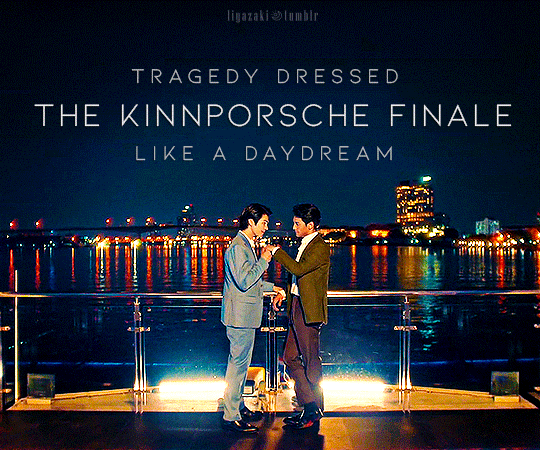
I know, I know- I went right for the jugular with that title. at first glance, this might look like a KinnPorsche finale hit piece...an "oh, y'all thought this was a HEA?" before I throw a bucket of gore all over your warm fuzzies, Carrie-style.
in reality? this is a long-form love letter to perhaps the most meticulously-constructed show I've seen in years- Asian, Western, European, etc., et. al. period, fin, full stop.
if there's an idea that KinnPorsche has driven home over and over again, it's that more than one thing can be true at once. that idea has never been more overt than in the finale.
something can be immensely satisfying, hella romantic, quietly appalling, empowering, and like a waking nightmare- all at once. for me, the finale was every one of these things- just maybe not for the reasons you'd expect. in summary: have a little faith before reaching for the pitchforks (thanks in advance).
but first: a little history, a little fandom
some background before we jump into the, as @dancinbutterfly likes to say, "it's about the DRAMATURGY"- of it all. I've been going into every piece of media for years now with as close to the inverse of expectations as you can get, because she has been burned and then some. I've been in fandom of all sorts for many, many moons. perpetual disappointment followed by headcannoning fixes are old friends, and I know them well.
I dumbed this show down before it even began, at no fault of the story or crew or anything else. eliminating my expectations before the word 'go' is just something that happens automatically. if you had told me pre-KP that a quasi-porn-with-feels, Thai-BL-meets-the-mafia show would shock me out of my media coma, I would've just giggled and said "sure, Jan".
that's exactly what happened, though: week after week, this show gave and gave and gave some more. unapologetic queer horniness on full display? here; take it. you want a light, joyful relationship in contrast to perhaps the most intoxicatingly-toxic one you've ever seen? sure, we got that too. how about fascinating moral quandaries and a dark, twisty thread of mystery running throughout? we got you covered and then some.
and oof, that mystery. the possibilities, the implications? the personal ramifications for these characters we were falling in love with? crumbs were suddenly being dropped from a table I forgot could have so much food on it, and I grabbed onto as many morsels as I could get my greedy little hands on.
we all did: the sheer amount of god-tier analysis and meta this fandom created is a testament to that. this show awoke something in our brains that made the collective talent shine brighter than I've seen in a fandom in a long while (Bad Buddy is a close second).
and then- the Finale™
but the real pièce de résistance here: the part of this horny, batshit beauty of a story that puts this show front and center in my mental hall of fame? that finale. pardon the crassness, but it's very much warranted here: that FUCKING FINALE. it was more than the sum of its parts, while simultaneously being the EXACT sum in a whispering, "are-you-paying-attention?" kind of way.
it confirmed little red flags I didn't even trust I was really seeing, which, sure- that's just good writing, solid storytelling. but then it said "nah- we're not done", and stuck the landing so intelligently, it elevated the rest of the story past my wildest expectations. thanks to the finale, I know that my rewatches (yeah, it'll be plural- move along) will be a perpetual mind-fuck affectionate.
it set up us for a likely-explosive second season, with as much potential for greatness as there is for Shakespearean levels of tragedy. without that 81-minute magnum opus, I doubt I would’ve been compelled to write this monster in the first place.
so let's get into the impact of the finale by taking a closer look at the most important players- starting with our sex-on-a-stick (I had to), second-in-command himself.
without further ado: you ready for a deep dive?
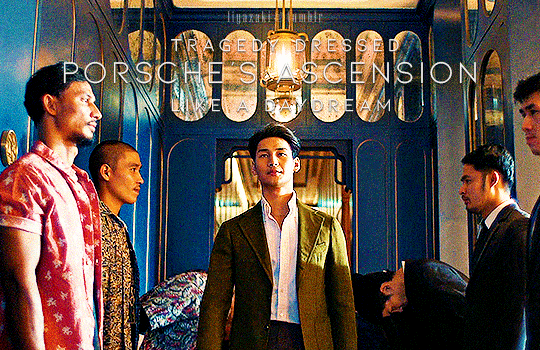
kiss me so that I forget myself. I close my eyes & fall in the abyss. -Kamand Kojouri
the title for this meta- Tragedy Dressed Like a Daydream- was inspired by Porsche's iconic walk down the hallway, cementing his new status as he symbolically ascends his throne.
my first thought during this scene- besides the obvious serve-CUNT-king- was, "that's a man who's walking to the gallows- he just doesn't know it yet."
Porsche also embodied raw, effortless power in this moment- but it carried even more weight than just that. this was an easy, almost-royal kind of stride- like he was born to it.
from Porsche's unforgettable presentation to the visual callbacks (more on that in a minute), this is the definition of a full circle moment. it felt less like the victorious kind and more of the snake-eating-its-tail variety, though. again, more on that analogy later.
my doom-and-gloom reaction to this scene has nothing to do with the fact that Porsche is not only staying in the Family, but rising to the top of its ranks. this is a mafia tale: I signed up for bullets, bloodshed, moral ambiguity and as much be-gay-do-more-crime as possible.
once I started to drill down into what exactly about this moment made me feel so unsettled, the reasons turned out to be much more nuanced.
a couple interesting details about this scene before we get into the nitty-gritty: we've seen this kind of oozes-power walk before. it's what I opened my Kinn character analysis with:
Kinn carries himself with the relaxed ease of an heir born to inherit a throne, and the singular, brutal focus required to keep it.
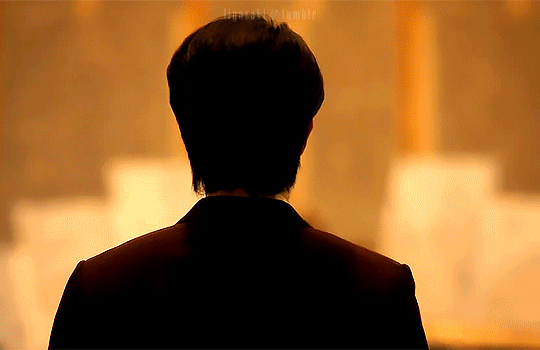
this is how Kinn walks into every room he enters- when anyone besides the people he's closest to are present, anyway.
there's so much I want to say here about the choice to film Kinn from behind versus Porsche head-on, the framing, etc., but I promised myself I wouldn't get too far into the weeds in this meta.
one more tidbit I noticed in this scene: Porsche never blinks- not once. a neat little trick I learned in Psych 101: blinking less communicates ease, confidence, lack of anxiety; while frequent blinking says "I'm afraid/nervous/lying." if you want someone to see you as more confident than you might feel, look them straight in the eye- or straight ahead and past them, like Porsche is here- and blink less. I doubt this was intentional, but it adds (subconsciously) to the powerful aura radiating off of Porsche.
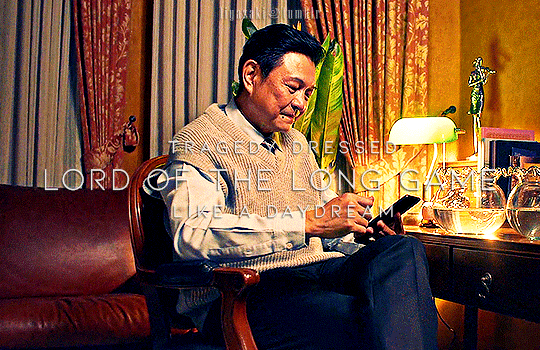
when you know what a man wants, you know who he is- and how to move him. -George R.R. Martin
belief can be manipulated. only knowledge is dangerous. -Frank Herbert
the triumphant veneer on Porsche's ascension starts to crack as soon as we ask, "how did he get here?" the answer- the rot at the root, discreetly leeching off all the life it touches- is Korn.
we're well-aware that Korn is a master manipulator. he knows his sons' strengths and weaknesses like the back of his hand.
what really makes Korn a force to be reckoned with is his patience. he's been using his knowledge of how to utilize his sons- like the tools I believe he sees them to be- for a very, very long time.
it took years-worth of quiet, methodical consistency to orchestrate the events we arrive to in the finale- and to best mold his sons to carry out his purposes. we've also been getting hints at this the entire time- some of which weren't made clear until the very last moments of the finale.
galaxy-brained @dancinbutterfly caught a god-tier hint at just how deep Korn's machinations go, and it happened in episode ONE- yet it's impact in the finale is enormous. if you aren't convinced that Korn has been planning on using Porsche from the start, you're gonna want to hold DB's/my beer for this one. I'm going to be giving the CliffNotes version, but you can read DB's epic finale analysis here.
the last scene in the finale- with Kinn and Porsche declaring their commitment to each other on the boat- is a callback to episode 1 already, bringing us back to where Porsche jumped off the deck. after Porsche escaped, we cut to Kinn and Korn in conversation. I'll quote DB directly here:
Kinn is asked why he didn't procure Porsche- and we see Korn playing chess. he's playing as white, and white always goes first. Korn always has the information needed to make the first move. he takes the queen [Porsche]- and he uses it to get checkmate.
back to the finale: right after Kinn and Porsche's final hug on the boat, we cut over to Korn. he's sitting at a desk with two betta fish in front of him (my theory on that in a minute). Korn stops to look at his phone, smiling at the picture of Kinn and Porsche that Tankhun just sent him.
Korn's expression is that of a warm, loving father, by all appearances happy to see his son happy- but it kind of just made my stomach roll. and then, we reach the line that takes us all the way back to Korn's first game of chess, right after the other boat scene when he won the game using the queen:
"history is only written by the victors."
not to lapse into tag speak in the middle of a semi-serious meta, but are you crying screaming throwing up yet? someone throw me a thesaurus because "chilling" doesn't cover the level of twisted we're witnessing here. the juxtaposition of these scenes in particular casts such a deep shadow over Kinn and Porsche's happy-for-now ending, it's impossible to ignore (again, all credit to DB for catching it).
Korn didn't just make Porsche's sudden meteoric rise happen- he orchestrated it all. this hint was just a standout one of many. I don't think Korn ever expected Kinn and Porsche to get romantically involved, but did he ever switch gears masterfully when they did.
there isn't a single event in the course of Kinn and Porsche's story that Korn didn't either 1) make happen himself or 2) expertly adapt and work to his advantage.
riddle me this: what could be better for Korn than having his ever-loyal but soft-at-heart son on the throne? let's dream even bigger: how about having his son's heart as his second? as smart as Porsche is, this isn't a world he's known for long- at all.
Porsche doesn't fully understand the rules or know the players- and he certainly doesn't have the benefit of experience required to see the bigger picture. Kinn's biggest weakness is now right out in the open, ready for Korn to exploit when and if needed.
for a man like Korn, what could be better than that?
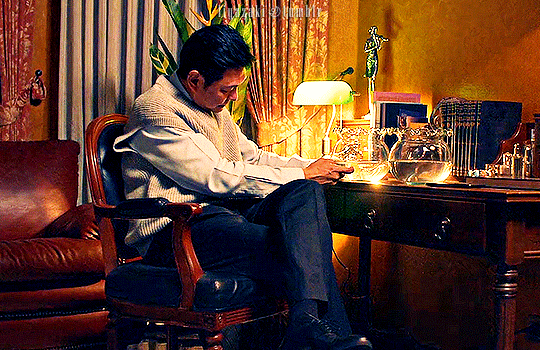
back to the fish, and what could be our last hint the finale at Korn's next move. betta fish- or fighting fish- are known for their aggression towards other bettas. Korn has the fish in two bowls, separate but still in each other's line of vision- and able to antagonize the other.
before he looks at his phone, Korn is tapping on just one of the bowls, almost like he's deliberately trying to rile the fish up. he's also watching them very intently- and Korn is the most intentional character in this show.
the meaning here is wide open to interpretation, but this moment doesn't feel accidental- next to nothing in this show is. I don't see how pitting Kinn and Porsche against each other at this stage in the game would work to Korn's benefit- they're the most obvious explanation- but I'm calling it now: there's something there, and I have a nasty feeling that it's important.
so- Korn is pulling all the strings. Kinn and Porsche are in power in name only. they’re simply pieces on the gameboard and they always will be, as long as Korn is alive. they’re only there because Korn wants them to be.
Porsche and Porchay were only reunited with their mother because Korn made it so. I could write pages of meta on those scenes alone- the combination of intelligence and fear in her eyes, her catatonic-seeming (but were they really?) reactions, ad nauseum.
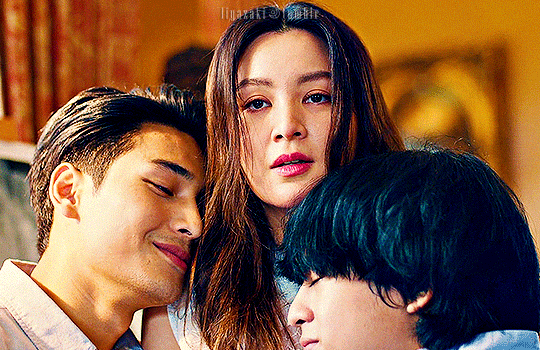
I'm not going to delve too deeply into the Namphueng plot here, but I have to mention that something about her reveal feels reactionary. the timing and suddenness of it feels more akin to thinking on your feet than it does to a long-game strategy. there has to be so much more happening here than we're aware of yet.
the main evidence of this for me: Korn left Namphueng essentially locked up in a tower for years. Korn is nothing if not brutally efficient. he could've used her just like he uses everyone else right out in the open. it would have been a million times more practical for him to go that route, but he didn't. that choice says something.
I don't know if I can buy into the idea that his only reason for pulling off this years-long kidnapping-in-plain-sight was just to time her reappearance in order to control Porsche (and Kinn by extension). we're missing a puzzle piece here- really, I feel like it's a lot of them.
which leads us to the million dollar question: what the hell does Korn know? how far down the rabbit hole does the history- and crimes- of this family go? Korn methodically knocked so many threatening pieces off the board, there's now history that ONLY KORN is privy to. let that sink in for a minute. if knowledge is power, Korn's is now near absolute.
Korn's inescapable influence takes what otherwise looks like a beautiful triumph- Kinn and Porsche, united, back where they started- and makes it look more like walking into an abyss.
when and if we get S2, I can guarantee that none of us are prepared for whatever Korn is planning next. like I mentioned in the beginning, the potential fallout for our players left on the gameboard is, in a word- catastrophic.
I'll wrap up this section with a chef's kiss quote from my beloved @elnotwoods:
I got so blinded by the metaphor and the symbolism [playing chess] that I overlooked the fact that the pieces on a chessboard only ever do what the player wants, because there are different ways to play, different moves and strategies- but it’s ultimately up to the person moving the pieces to decide.

so the story of man runs in a dreary circle, because he is not yet master of the earth that holds him. -Will Durant
there's also the issue of who Porsche is, and the question of if he did possess full autonomy here- i.e. if Korn wasn't making his moves for him from the shadows- would this be the choice he'd make? does it align with who he is- or, at least, with who he used to be?
because no one- outside of the people in the Family itself- have been more directly affected by the brutality that comes with the criminal underworld than Porsche and Porchay.
their parents: slaughtered in their home. debtors harassed and threatened them both for years, to the point that Porsche went to beg for mercy on his uncle's behalf. they had to feel like they were living in a semi-constant state of fear- likely with plenty of righteous anger and resentment mixed in, too.
so rather than just a cycle that repeats, we have a true tragedy here in the form of the metaphorical snake eating its tail. the Kittisawasd brothers' lives, loves, even their life's purpose (for Porsche, at least) are now inextricably linked to the cause of the greatest trauma they ever experienced. they're not just a part of the Family now- they sit its throne, either directly or by association.
love- especially the new, fresh, starry-eyed kind of love- has a way of blinding you. of bending you in ways you never thought you would, without either lashing out or getting out first.
is Porsche capable of thriving in this world? absolutely. will it require depths of compromise he can't even fathom yet? undoubtedly yes.
I also don't believe Porsche would have put Porchay within 1000 miles of everything Kinn's world brings if it weren't for love. the "keep your friends close and your enemies closer" argument could be made here- the enemy being the world of the Family, not Kinn himself- but it doesn't ring true for me.
plus, we have Porsche's own words to fall back on:
I'm not on the main family's side. I'm not on the minor family's side. I'm on your side.
Porsche is here for love and love alone. Kinn is here because he is ever-loyal...Porsche's love is a bonus. a life-changing, beautiful bonus- but just a bonus nonetheless.
I have to pause to address what Kinn did and said right before this moment. he doesn't know his father is alive, but Korn's influence- or maybe more accurately, Kinn's indoctrination- is still SO strong, Kinn pulls a gun on the man he loves at the mere possibility that Porsche MIGHT believe Korn was responsible for murdering his parents.
and do you believe him? if you believe him, you have to be on the main family's side. if not- we're on a different sides.
more on this when we talk about Kinn, but this is bone-chilling stuff.
to circle back to Porsche and how he got here: at the heart of it, his decisions aren't all that different from the things anyone who's been stupid-in-love have done or come close to doing: compromising your values, making exceptions- being blind to the bigger picture.
what could catapult Porsche's ascension into a full-blown tragedy (gay gods, let it not; I mostly like being alive) ultimately rests on the gorgeous shoulders of our next major player.
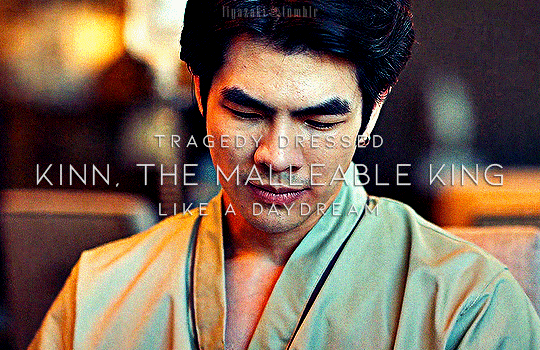
the proverb warns that 'you shouldn't bite the hand that feeds you.' but maybe you should, if it prevents you from feeding yourself. -Thomas Stephen Szasz
while pretty much all of Korn's scenes gave us glimpses of his manipulation, they showed us something else equally important: the depths of Kinn's devotion, specifically to his family and the Family. in Kinn's mind? I don't think he can tell the difference between the two.
this isn't Kinn's fault- he never stood a chance. how could he? Korn's had an actual lifetime to subtly shape and mold Kinn into the obedient foot-soldier-in-a-Gucci-suit he is today- and did he ever get started with him young.
remember Kinn's fireside confessional? he told Porsche about his dream as a kid to be a singer, but he seemed to let go of that dream almost as quickly as it came. where did Kinn get the idea of having to step up to take the burden off of Tankhun if not from Korn?
he was a child, but the walls of his cage were already closing in- and he was none the wiser. cut to all of these years later, and he STILL isn't aware. Kinn is incredibly kind, caring and soft with the people he loves, so he just said "yes- I can carry this great and terrible thing." he took on the burden, and his life is forever changed because of it.
he can't get that time back, that dream, or take back all the things he's done in service to Korn since. he's left with wistful "I wonders" before shaking himself off and moving onto whatever task is assigned to him next.
Korn is incredibly aware that love- romantic or otherwise- is Kinn's Achilles heel. all he has to do is casually mention how much the Family needs him (e.g. the apple scene) and boom- Kinn immediately falls back in line. Kinn would move heaven and earth for Porsche, but his blind loyalty to Korn is just as strong, if not stronger- the ultimate question, really.
and it bears repeating: Kinn's blindness is through no fault of his own. he's been systematically manipulated and groomed into becoming the man he is today. the fact that he's retained as much of his humanity as he has is a small miracle- however compartmentalized that humanity might be (read: being able to assassinate someone on the spot without a sideways glance).
if Porsche was walking to the metaphorical gallows unaware, Kinn is living on the knife’s edge, not realizing how incredibly precarious his newfound happiness is. he has faith in a foundation that doesn't exist. he's been drinking from a poisoned well all his life, and he's unwittingly invited Porsche to partake, as well.
I have no doubt Kinn’s intentions are good, and that his love for Porsche is as true, deep and real as any. it's the same sort of unquestioning, all-encompassing love- for his family, THE Family- that could be their ultimate undoing.
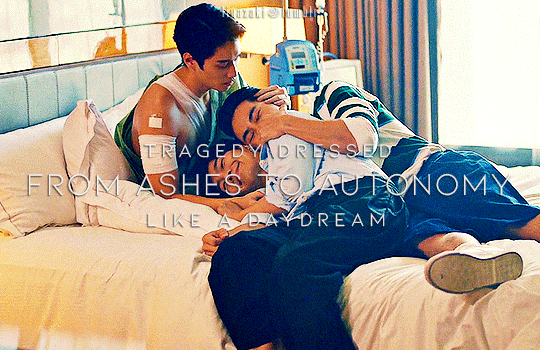
I am no bird; and no net ensnares me. -Charlotte Brontë
we're going to stick to the surface streets where Vegas and Pete are concerned, because to the shock of absolutely none of you who know me, I could write a book on them.
however, I have to highlight the stark contrast their story provides in the finale against Kinn and Porsche's. they were the only characters who walked away with complete autonomy.
what felt like the final nail in coffin to Vegas- no longer being in line to assume his father's position, gain his power and prove himself worthy- was his saving grace. again, this isn't because they got out of the mafia, but because they got out from under Korn- which, irony heaped upon irony, was still Korn's doing.
for now, Vegas, Pete and Macau have been set to the side of the game board by our main player. they're out of the game, but they'll still receive some of its benefits (likely financial). it's probably the best outcome they could have gotten.
regardless of how it came about, or whatever the future holds for Pete and Vegas- it'll be a future they author together from start to finish. they're going into this new chapter with their eyes wide open, their feet on the ground and with a mutual purpose- to somehow be a family- based exclusively on what they want and need most.
I wish that wasn't more than I could say for Kinn and Porsche, but with where we leave them in the finale, it is- for now.

we aren't one story- we can change our stories. we can write our own. -A. Poehler
and so, we reach the end. Kinn and Porsche are silhouetted against/almost swallowed by the darkness behind them (intentional? I'm thinking yes) on the deck of the boat where it all started.
everything has been leading us to this moment- even their final lines are a callback. Porsche is gazing at Kinn with so much warmth and affection, declaring that his life is Kinn's. Kinn assures him he'll treasure it, clearly in bliss- probably feeling like he finally has everything he's ever wanted.
the parallel- along with Porsche repeating again that he's there for Kinn and Kinn alone- gave me chills at all the high-romanticism, coupled with deeply-ominous foreshadowing.
Porsche's life is now Kinn's, and Porsche would give him absolutely everything (he already has). can the same be said for Kinn? is he capable of rising above a lifetime of submission to Korn for their relationship's sake, for Porsche's sake- or most importantly, for his own? Kinn and Porsche are on equal footing on the surface only, and Porsche couldn't be at a more dangerous disadvantage.
as @dancinbutterfly put it to me so eloquently:
there can't be equanimity when one person is standing on earth & the other is in chains, looking up at him from the heart of hell.
I have to use our catchphrase one last time here, because it's never been more applicable: this scene is the definition of many things can be true at once. when we step back to look at the state of play, the bigger picture- Kinn and Porsche's final moment is as tender and heartfelt as it is potentially heart-wrenching.
we're watching these characters we've come to know and love teeter on the edge of a precipice they don't even know exists- but we do. Korn knows- he created it, and he even gets the literal last word- not counting the small bit of dialogue in the final-final scene with Porsche, Porchay and Namphueng.
I was so distracted by the beauty of the relationships between our main/side characters and how they were developing, I didn't go over many of these small- but, in retrospect, crucial- details too deeply, until the finale left me feeling so uneasy, I had to figure out why. even that might have been intentional.
not to go crazy conspiracy board here (but I will): how poetic would it be if the intention all along was to 'dupe' (but not really, because we're talking about it here) the audience into being in exactly the same mental boat as Kinn and Porsche?
i.e. we're so distracted by all the pretty, shiny things (love! HEA! they're in power together! etc.) that we don't see the forest for the trees? I really hope- and dread- that we might get to see it all come to awful, angst-ridden fruition in a second season. because that, my friends? truly god-tier level story telling.
even with all this possibility for heart-wrenching fallout, I've never felt 'safer' as a viewer as I do in the hands of these writers. they left some plotlines under-developed or unaddressed entirely (for now), but the unforgettable story this team managed to create from the mostly-trash heap that is the source material is a testament to their professional prowess, and evidence of all the thought and care they poured into KinnPorsche.
this show has consistently delivered on every promise it made, and managed to surprise me at every turn. I don't know exactly where we're going from here, but if we get to see Kinn and Porsche's story continue? I can't wait to see where they take us- even if it rips our collective hearts out in the process.
what a way to go, no?
special thanks to @dancinbutterfly for going full-on Pepe Silvia with me through half the night (more than once) while I slogged through this thing, and to my wonderful wifey @elnotwoods for helping get my ideas off the ground 💖
tagging some lovely peeps who have been patiently waiting for this behemoth to drop: @patprans @ellaspore @bengiyo @snimeat @rainbowcolored7 @maleficent-cannoli @i-got-the-feels @shinwoonoh @risu442.
as usual whenever I write long-form, I’m doubting whether I actually said anything at all here? either way- thank you for reading this far & I hope you enjoyed it 🖤
#kinnporsche#kinnporsche the series#kinnporsche meta#kinnporsche analysis#kinnporsche finale#kinn x porsche#mile phakphum#apo nattawin#mileapo#biblebuild#vegaspete#tonanons#usernuria#userjaehwany#userjap#uservik#todramaism#kp meta#vegaspete meta#kinnporsche*
850 notes
·
View notes
Note
Hi!! Thank you for doing all this! I wasn't sure if this was already something you've been asked about, but do you know of any arranged marriage fics? I keep trying to find some but the filter always looks for the arrangement instead. I figured I'd give asking you a shot!
Thank you!!
Hello! There are a few posts on our #arranged marriage tag. Here are some more for you...
Comfort, Keep, and Honor by Meridians_of_Madness (M)
If Heaven and Hell decided that they needed their Earth operatives married straight from the beginning- well, it all ends the same way, but the road getting there is different. An Arranged Marriage AU.
An Arrangement of True Minds by Sodium_Azide (T)
Two families, alike in pragmatism if not dignity, make an arrangement 14th century style.
Aziraphale Fell and Anthony Crowley do their family duty, as they understand it, but their actual sacrifice wasn't written in the prenup.
Circumstances of Distinction by angelsnuffbox (M)
"Once, when Aziraphale was younger and far more of a romantic, he had hoped to be swept off his feet into a whirlwind romance: to feel his heart grow asunder over the passionate thrills of love - a Shakespearean love, filled with flowery words and heated confessions. But such aspirations did not long last. In these circles of society, people married for power. For alliance. To marry for love was to condemn oneself to a life of poverty. And to find that love, out of circumstance, from the stale negotiations of a wedded alliance was above all the greatest privilege, one that could not be afforded by even the wealthiest creature in the world."
*
Sir Anthony Crowley has been living his independent life as a cast-out younger son when he had a baronetcy and failing estate suddenly thrust upon him. Mr Aziraphale, son of a wealthy tradesman, could be the answer to his troubles. A balance of rank and wealth, was this not just what unions were for? A series of meetings in the ballrooms of Bath will determine what fate has in store for these two.
A (non angsty) Regency era arranged marriage AU
Just Married by TawnyOwl95 (E)
Aziraphale East does not wish to get married.
His mother has other ideas. After all, what other choice does a gently bred omega have?
When Aziraphale persists in rejecting suitors, Mrs East takes matters into her own hands. However she has thoroughly underestimated how stubborn her youngest child can be.
As does his new husband.
to linger in you by NaroMoreau (E)
An arranged marriage is set in place before Aziraphale can be crowned as a King. He hates the idea but there's nothing to be done.
Luckily, his betrothed turns out to be quite agreeable, except...
... not everything is as it seems.
Incorporation by Ack_Emma (E)
Best friends from rival wool merchant families, Antoinetta Crowley and Aziraphale Fell are shocked when their parents arrange a surprise marriage between them.
But this new arrangement is a chance to be on their own side and to be left alone for a bit. Their lifelong friendship is solid, what could go wrong?
As it turns out, plenty.
Times are changing, and married life is harder than it looks when you're a pair of young, ineffable dorks.
- Mod D
#good omens#ineffable husbands#ineffable partners#arranged marriage#human au#regency#adult omens#mod d
101 notes
·
View notes
Text
📯 HP BardFest Fic 📯
📜 A New Form of Sight
✒️ Pairing: Gen
✒️ Characters: Sybill Trelawney, Minerva McGonagall, Firenze, 8th-year students
✒️ Rating & Length: Teen & Up, 8,089
✒️ Shakespeare Work: Sonnets
⚡ Tags: Screenplay/Script Format, Iambic Pentameter, Sonnets, Sonnets That May Or May Not Be Prophecies, Minor Hermione Granger/Draco Malfoy, Minor Luna Lovegood/Theodore Nott, Reconciliation and Healing (Through Poetry), Hogwarts Eighth Year, Mentions of alcohol, Sherry-Induced Poetry and Hangovers
Summary:
Sybill had a little too much sherry last night and can't remember writing all these sonnets. Some predict love, some predict doom, but are any of them true prophecies? She decides to find out.
A five-act play written in a Shakespearean style for the HP Bard Fest!
Read on ao3
#hp bardfest#shakespeare#harry potter fanfiction#hp fanfiction#shakespeare related fanworks#shakespeare's sonnets#sybill trelawney#an actual play in iambic pentameter!!!
16 notes
·
View notes
Text
She’s quick to shut down any attempts on her interviewer’s part to overintellectualise either the plays or her “process”; when O’Hea explains that “nothing” is thought to be Elizabethan slang for female genitalia, she retorts: “Much Ado About Vagina? Don’t be ridiculous … Some dirty-minded scholar with no sex life has made that up.”
...be assured that the book is full of ribald anecdotes, many involving, in true Shakespearean style, mistaken identities. She tells of one promenade production where she spotted a director she knew in the audience and dropped a note into his lap as she passed that read “I suppose a fuck’s out of the question”. “But when I glanced over during the scene, I saw that it wasn’t Howard at all, but a much older gentleman who looked very alarmed.”
25 notes
·
View notes
Text
Deutschribing Germany
Literature
Middle Ages (5th-15th centuries)
Medieval German literature can be divided into two periods: Old High German literature (8th-11th centuries) and Middle High German literature (12th-14th centuries). The only surviving works from the first period are the Hildebrandslied (Lay of Hildebrand), which is the earliest poetic text in German and tells of the tragic encounter in battle between a father and a son, and Muspilli, which deals with the fate of the soul after death and at the Last Judgment.

Middle High German literature saw a 60-year golden age known as mittelhochdeutsche Blütezeit, in which lyric poetry in the form of Minnesang—the German version of courtly love—blossomed thanks to poets such as Walther von der Vogelweide and Wolfram von Eschenbach. Another important genre during this time was epic poetry, of which the most famous example is the Nibelungenlied (The Song of the Nibelungs), which narrates the story of prince Siegfried and princess Kriemhild, among other characters.
Renaissance (15th-16th centuries)
Early New High German literature includes works such as Der Ring (The Ring) by Heinrich Wittenwiler, a 9,699-line satirical poem where each line is marked with red or green ink depending on the seriousness of the material, and Das Narrenschiff (Ship of Fools) by Sebastian Brant, a satirical allegory that contains the ship of fools trope.
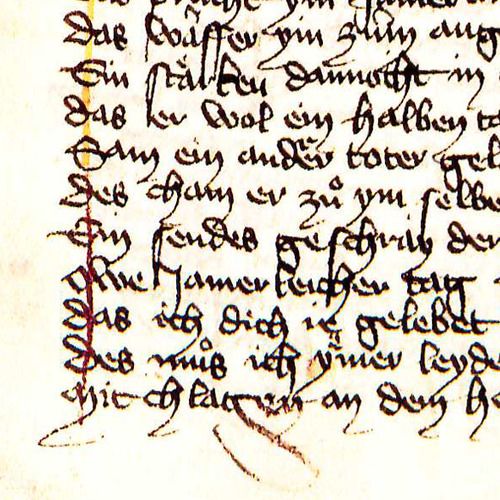
Other important authors are satirist and poet Thomas Murner, humanist Sebastian Franck, and poets Johannes von Tepl and Oswald von Wolkenstein.
Baroque (16th-17th centuries)
The Baroque period is characterized by works that reflected the experiences of the Thirty Years’ War and tragedies (Trauerspiele) on Classical themes, the latter were written by authors such as Andreas Gryphius and Daniel Caspar von Lohenstein. The most famous work is Der abenteuerliche Simplicissimus (Simplicius Simplicissimus) by Hans Jakob Christoffel von Grimmelshausen, a picaresque novel that narrates the adventures of the naïve Simplicissimus.

Enlightenment (17th-18th centuries)
The most important writers of the Enlightenment are Christian Felix Weiße, Christoph Martin Wieland, Gotthold Ephraim Lessing, and Johann Gottfried Herder.
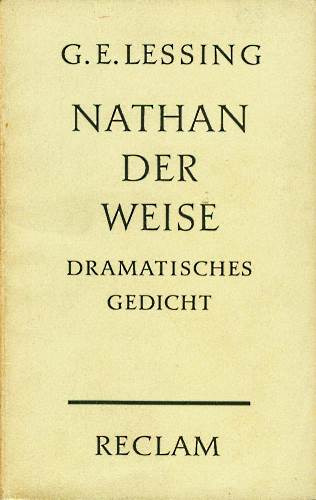
The Age of Reason saw the emergence of two literary movements: Empfindsamkeit (sentimental style) and Sturm und Drang (storm and stress). The first one intended to express true and natural feelings and featured sudden mood changes. The latter movement was characterized by individual subjectivity and extremes of emotion in response to the rationalism imposed by the Enlightenment.
Weimar Classicism (18th-19th centuries)
The main drivers behind Weimar Classicism, which synthesized ideas from Classicism, the Enlightenment, and Romanticism, were Johann Christoph Friedrich von Schiller, and Johann Wolfgang von Goethe.
During this period, Schiller published Die Bürgschaft (The Pledge), a ballad based on the legend of Damon and Pythias found in the Latin Fabulae, and Don Karlos (Don Carlos), a historical tragedy about Carlos, Prince of Asturias, while Goethe wrote Egmont, a play heavily influenced by Shakespearean tragedy, and Faust, a tragic play in which the main character sells his soul to the devil that is considered the greatest work of German literature.
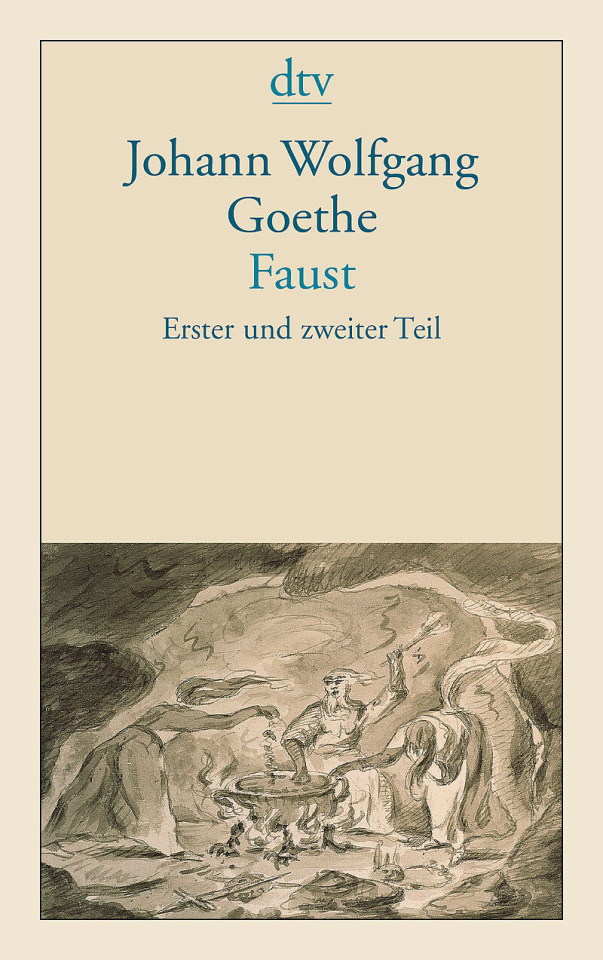
Romanticism (18th-19th centuries)
Important Romantic writers include E. T. A. Hoffmann, author of Der Sandmann (The Sandman), a short story based on the mythical character of said name that puts people to sleep by sprinkling sand on their eyes; Heinrich von Kleist, who wrote Das Kätchen von Heilbronn (The Little Catherine of Heilbronn), a drama set in Swabia in the Middle Ages; Joseph Freiherr von Eichendorff, author of Das Marmorbild (The Marble Statue), a novella about a man who struggles to choose between piety and a world of art, and Novalis, author of Hymnen an die Nacht (Hymns to the Night), a collection of six poems.
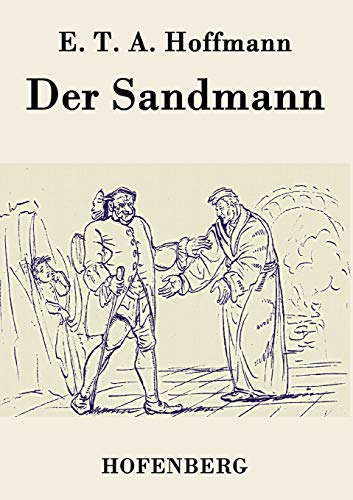
Folk tales collected by the Brothers Grimm became very popular during the Romantic period, as they represented a pure form of national literature and culture.
Biedermeier and Young Germany (19th century)
The Biedermeier period contrasts with the Romantic era and is best exemplified by poets Adelbert von Chamisso, Annette von Droste-Hülshoff, and Wilhelm Müller.
Young Germany was a youth movement whose main proponents were Karl Gutzkow, Ludolf Wienbarg, and Theodor Mundt.
Realism and Naturalism (19th century)
The most representatives realist authors are Gustav Freytag, Theodor Fontane, and Theodor Storm, while Gerhart Hauptmann was the most important naturalist writer.
Weimar literature (20th century)
During the Weimar Republic, writers such as Erich Maria Remarque, Heinrich Mann, and Thomas Mann presented a bleak look at the world and the failure of politics and society.

Expressionism (20th century)
As a modernist movement, Expressionism presented the world solely from a subjective perspective, distorting it for emotional effect. Famous authors include novelists Alfred Döblin and Franz Kafka, playwrights Ernst Toller and Georg Kaiser, and poets August Stramm and Else Lasker-Schüler.
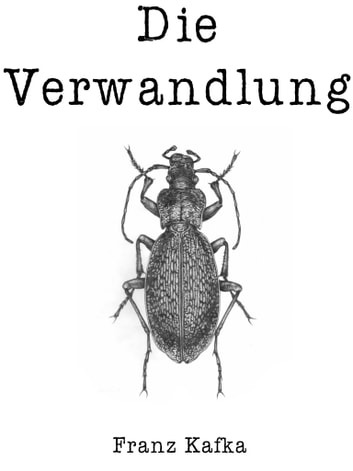
Neue Sachlichkeit (20th century)
Neue Sachlichkeit (New Objectivity) arose as a reaction against expressionism and was characterized by its political perspective on reality and portrayal of dystopias in an emotionless reporting style, showing cynicism about humanity. Authors associated with this movement include Erich Kästner, Hans Fallada, and Irmgard Keun.
Nazi Germany (1933-1945)
During the Nazi regime, some authors went into exile, while others submitted to censorship. The former, who either were of Jewish ancestry or opposed the regime for political reasons, include writers Alice Rühle-Gerstel and Anna Seghers, playwright Bertolt Brecht, and poet and novelist Hermann Hesse/Emil Sinclair.

Those who stayed and engaged in inner emigration include writer Friedrich Reck-Malleczewen, poet and essayist Gottfried Benn, writer Hans Blüher, and poet and novelist Ricarda Huch.
Post-war literature (20th century)
The most famous authors in West Germany were Edgar Hilsenrath, Günter Grass, Heinrich Böll, and Group 47, a group of participants in writers’ meetings invited by Hans Werner Richter.
East German writers include Christa Wolf, Heiner Müller, Reiner Kunze, and Sarah Kirsch.

Contemporary literature (21st century)
Fantasy and science fiction authors include Andreas Eschbach, Frank Schätzing, and Wolfgang Hohlbein. Some of the most important poets are Aldona Gustas, Hans Magnus Enzensberger, and Jürgen Becker. Thriller is best represented by Ingrid Noll. Fiction novelists include Herta Müller, Siegfried Lenz, and Wilhelm Genazino.

20 notes
·
View notes
Note
We’re in charge of the next legacy of Kain …..what would your approach be?”
Thank you for sending me this.
I cannot speak for anyone else, but if I were in charge, it would be a total remake. I would give it the LAU treatment. It would essentially be the same story, with the same characters, but updated. A reimagining.
Take the story back to the start and remake it with today’s tech, upgraded physics, controls, fight mechanics, new puzzles, the entire works.
But the most important thing is that it feels like a Legacy of Kain game.
For that you’d have to use the same rich aesthetic with deep, jewelled colours of the original series. Not the washed-out, grey-brown AC/Skyrim style palette that was all the rage in the last decade.
Remaster the soundtrack with strong leanings into the original themes.
Ideally enlist the help of Amy Hennig with the script and direction. She’s still out there, making games. I’m sure she’d love to remake and finish what she started. Allow her to tell the story she wanted to tell without interference.
If Amy wasn't available, at least stay true to that original tone. One of the most applauded things about Legacy of Kain is the Shakespearean-style dialogue, and that can’t change. Or it just won’t feel like Legacy of Kain.
Recast with some of the new exceptional voice talent out there today. Don’t be hung up on ‘you can’t recast this role’ - it’s been done before in other series and worked amazingly well (God of War, for example). I’ll save my ideal LoK recastings for another post.
Start with Blood Omen. But keep the third-person action adventure style of the Soul Reaver era.
Re-write the story with diverse characters.
Don’t fall into the Trinity trap. The rule of thumb in writing circles is this. If your female character can be replaced by a signpost for your male protagonist to learn from and surpass without changing the story, then she wasn’t a ‘strong female character’ after all.
Disclaimer - Ariel is not a strong female character, but she was never meant to be. Someone had to play that role, be it male or female. That doesn't mean there cannot be others. But I’d rather have no representation than bad representation.
Gender-bending a few of the brothers would be one way to do it. Or re-instate the sorceress content. But no nudity, and no modern swearing. Sex is great, but if all you have is sex appeal, strip that away, it’s still a bad game. Sex appeal is just unnecessary window dressing to a story like Legacy of Kain.
Don’t use poor treatment of a female character to motivate your male protagonist. Raziel didn’t need female trauma dangled in front of him as motivation, and neither should Kain, or anyone else, for that matter.
Bodyshock is fine. It's always been part of Legacy of Kain, but again, don’t take a pregnant woman and turn her and her child into some kind of abomination. Female trauma for shocks is cheap. If you’re going to do that to a female protagonist (say, Ripley, for example), then at least you’re not taking away her agency. But if you’re doing it just to motivate your male character, it takes away her agency and becomes highly misogynistic.
Above all, finish the story. Don’t let Raziel heal the scion of balance and then say, ‘Oh well, part three was the end of the story’ - make his journey and sacrifice mean something.
Allow your protagonists to jump around in time, but their personal journeys must have a beginning, a middle, and a meaningful, satisfying end.
What do you think? How would you do it? Let me know your thoughts.
#legacy of kain#crystal dynamics#blood omen#soul reaver#legacy of kain defiance#kain#raziel#asks and answers#thank you again for the ask#ariel remembers what others have forgotten
4 notes
·
View notes
Note
hello my darling, hope everything is going well 🧡 ok now let’s talk business: could you give me a list of your 5 top favorite podcast, with a little description and your impressions? Please and thank you I’m super curious 🧡
Hello my love! I'm so sorry for disappearing, I've been drowning in finals season. But I'm finally free and here to talk about podcasts with you!
My current top 5 favourites are:
Arden: A fictional podcast about people making a true crime podcast. And it's modern Shakespearean retellings! I didn't know that bit when I started the show and after a while I connected the dots and it was all so interesting. An investigative journalist gets stuck making a podcast with an ex private detective, and they "hate" each other, so for the better half of the episode initially, it's just them arguing over small things. So if you like enemies to lovers, Shakespeare, true crime and a bite at capitalism with the most weirdest ad breaks I've ever heard, I'd highly recommend.
Mabel: it's a horror podcast, and it's about my favourite trope too, i.e, a fucked up house. It's about a carer leaving messages to her client's estranged granddaughter, Mabel. The narrative is so beautiful and haunting, I love it and the house too! I love the idea of houses that are haunting rather than haunted, abandoned houses rejecting humanity, houses that love or hate you to a destructive degree, houses that give too much to the point that they stifle you, houses that take too much until there's nothing left of you but a forgotten carcass at the mercy of time, just fucked up houses in general.
The Silt Verses: do you like the horror around Gods? Yes, the idea of gods existing is about mercy and humanity and generosity etc etc, but there's also the horror of Gods. Gods that are everywhere, within everything, but they're hungry and they need to be fed, they need to feed. They're always hungry, always starving. Gods whose ideas of generosity and miracles and gifts are so far from our own morals and ideas that it's just monstrous. Gods are everywhere and they're hungry. Good existential horror, makes me feel like this 🧍🏽♀️ when I listen to it.
Out of Sight: this!! This one's a bit hard to explain, but it's basically about this supernatural investigator and his partner Lazari. Each episode has a different supernatural mystery but they have Lazari's own troubles connecting them all. It's all about creepy legends, ghosts and two people trying to fix those problems while making a podcast out of it.
The White Vault: See I got attached to all of the characters, and that's what I'd recommend you not do because this is a found-footage style podcast. Now that we've got that covered, it's got five seasons, and I'll tell you how it starts and why it's terrifying. It starts with a repair team being sent to an arctic outpost, where they get stuck and are isolated for a while. Here things go south, because this is a horror podcast, so yes, things go down south incredibly fast. The voice cast is amazing, the sounds are amazing, and the details are gory. Then when we come to season 3, it gets worse, because we realize the monster was the least of our worries. Me and @queridaz lost our minds over this and I've still not finished season 5.
#asks#cat 🌝#podcasts#arden#mabel#the silt verses#the white vault#out of sight#I'm so sorry for the late reply#ive been all over the place and my uni wanted me ded#its been a fun month#but hiii#finally here
35 notes
·
View notes
Text
Portrait: Grace Clarke

Childhood:
Grace Clarke's childhood was marked by a deep passion for the performing arts. From a young age, she showed a natural talent for singing and acting, captivating audiences with her charisma and stage presence.
Born into a family with a rich artistic heritage, Grace was surrounded by music, theater, and creativity from the moment she was born. Her parents, both accomplished actors, nurtured her talent and encouraged her to pursue her dreams.
Grace's early years were spent in the spotlight, with her first foray into acting beginning as a baby. From commercial shoots to small roles in television shows, she quickly made a name for herself in the entertainment industry, paving the way for a successful career in show business.
Hobbies:
Grace's hobbies reflect her diverse interests and zest for life. A true Renaissance woman, she finds joy and inspiration in a variety of activities:
Singing: Music is Grace's first love, and she finds solace and expression in the melodies she creates. Whether she's performing on stage or singing in the shower, her voice carries a soulful resonance that touches hearts.
Acting: Grace's theatrical talents shine on both stage and screen, where she brings characters to life with depth and authenticity. From Shakespearean dramas to modern-day romances, she embraces the challenge of embodying diverse roles and exploring the human experience.
Dressing Up: With a flair for fashion and a keen eye for style, Grace enjoys experimenting with different looks and personas. Whether she's donning elegant gowns for red carpet events or rocking casual chic attire for a day out, she exudes confidence and sophistication.
Surfing: As a lover of adventure and adrenaline, Grace thrives on the exhilarating rush of riding the waves. Surfing provides her with a sense of freedom and connection to nature, allowing her to recharge and rejuvenate amidst the beauty of the ocean.
Yoga: Grace finds inner peace and balance through the practice of yoga, embracing mindfulness and meditation as tools for self-discovery and personal growth. The ancient discipline helps her stay grounded and centered, even amidst the whirlwind of fame and celebrity.
Cooking: In the kitchen, Grace unleashes her creativity and culinary prowess, delighting in the art of creating delicious meals from scratch. Cooking allows her to nourish both body and soul, infusing her dishes with love and passion for food.
Love/Sex Life:
Grace Clarke's love life is a topic of fascination for tabloids and fans alike, with rumors swirling about her romantic escapades and celebrity flings. Despite the media scrutiny, Grace maintains a level of privacy when it comes to her personal relationships, preferring to keep the details of her love life out of the public eye.
As a high-profile celebrity, Grace has been linked to various A-list actors and musicians over the years, but she remains tight-lipped about her romantic entanglements. While she enjoys the thrill of casual dating and romantic encounters, she's wary of getting too involved in serious relationships, knowing the challenges that come with dating in the spotlight.
Grace's approach to sex is one of empowerment and agency, embracing her sexuality with confidence and autonomy. She believes in open communication and mutual respect in intimate relationships, prioritizing consent and boundaries above all else.
Job as an Actor:
Grace Clarke's journey as an actor began at a tender age, with her debut performance as a baby in a television commercial. From that moment on, she was destined for the limelight, captivating audiences with her natural charisma and undeniable talent.
Over the years, Grace has honed her craft through rigorous training and dedication, transitioning seamlessly from child star to leading lady. Her versatility as an actor has allowed her to tackle a wide range of roles, from romantic comedies to intense dramas, earning her critical acclaim and adoration from fans worldwide.
Despite her fame and success, Grace remains grounded and humble, approaching each role with humility and professionalism. She's known for her commitment to her craft, immersing herself fully in the characters she portrays and bringing depth and authenticity to every performance.
Grace's collaboration with Rachel Bakshi, albeit brief, holds a special place in her heart. While they may not have bonded deeply off-screen, their shared experiences on set forged a connection rooted in mutual respect and admiration. Grace fondly remembers their time together, cherishing the memories of their performances and the camaraderie they shared as fellow actors.
Green Flag: Respectful of Boundaries
Red Flag: Prone to Dramatic Outbursts
5 notes
·
View notes
Text
Heyyy Tumblr!!!

Im Sloppy (you can literally just call me that) and I write fan-fiction about a myriad of different things
A bit about me is that I’m a proud lesbian and listen to many manyyy different bands but especially MCR- I get very fixated on things and just can’t crank out enough writing since I’m so spastic, but that’s why I’m making this blog! To get me on track :)
I also play the guitar and draw. I generally love all kinds of art (NOT AI) and read quite a bit, ranging from classics like Crime And Punishment to newer novels like Twilight, All the Stars and Teeth, and An Enchantment of Ravens
I also watch tv (ofc) and have loved American Horror Story for the longest time and am so into Buffy The Vampire Slayer
I’m also a bit of a gamer (lol) and I’ve especially fixated on Hades (so excited for the second), I’m Stuck In A Yandere Visual Novel, Honkai Star Rail, and Minecraft. I’m pretty active on Itch.io in general, checking out new games from indie devs :)

I’ve written:
•After The Battle; a fic on Octavian/Dakota from Heros Of Olympus written in a style based off of Song Of Achilles
•Prince of Cats, Duke of Birds; a fic on Tybalt/Mercutio from Romeo and Juliet (og Shakespeare) with the occasional Shakespearean accent
Im working on:
• A spin on Carmilla (1872), based around a character study on Carmilla/Laura which will be focusing more on their relationship- this idea is a bit loose since I eventually want to stray from the original plot to make it more explicitly lesbian and not like it was written by a man in 1872
• A fic in the world of I’m Stuck In a Yandere Visual Novel- I’m chipping away at the concept on this and getting my outline done. I’m really excited for this one personally since I’m not having to read through books to make sure I’m true to the characters and can instead just play the game again :)! It’s also a bit of a passion project of mine. Also, with the way I’m writing this, you don’t have to have played the game to understand the novel so if you’re into Yandere or Yandere/Yandere type stuff you should totally stay tuned
• The next chapters of Prince of Cats (1/3 done so far)
• Honkai Star Rail one-shots
I’m Open To Suggestions!
Please leave suggestions in my asks for either media I should check out or just ideas you’d like to see in writing
Let me clarify that this is NOT a garunte I’ll write it, just a thought box
And FIANLLY, my ao3 link;
(Paste isn’t working hold on)
Thank you! Please drop a follow or a reblog :)
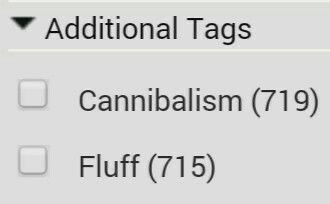
#crime and punishment#twilight#bella swan#all the stars and teeth#ao3 fanfic#ao3 link#ao3 writer#ao3 author#ao3feed#ao3fic#american horror story#hades game#hades#hades supergiant#I’m stuck in a Yandere visual novel#honkai star rail#lesbian#song of achilles#romeo and juliet#Carmilla#ao3 stuff#fanfic author#archive of our own#fanfiction#fanfic#ao3#stuckinyanVN
3 notes
·
View notes
Note
most unique character you’ve read?
Thanks, it's an interesting question—and strangely difficult to answer. "Unique" in my personal opinion? Or relative to some historical baseline of common characters? Uniqueness in characters is also hard to get right: too unique and they become unintelligible, or else merely zany. It's a quality gently discouraged by systematizing critics: Marxists who prefer characters to be socially typical, for example, or psychoanalysts or structuralists who'd rather they be mythical or archetypal. But even the pure aesthete has concerns here: a character unique enough to get up and walk out of the book—my own ambition with some of my characters, like Alice Nicchio-Strand of Portraits and Ashes or Ash del Greco of Major Arcana—may violate a book's hard-won sense of accomplished style. So some great prose stylists didn't create terribly unique characters, likely in consequence of their style's very integrity: e.g., Hemingway, Woolf, DeLillo. Melville has a metafictional reflection on the creation of original characters in The Confidence-Man:
As for original characters in fiction, a grateful reader will, on meeting with one, keep the anniversary of that day. True, we sometimes hear of an author who, at one creation, produces some two or three score such characters; it may be possible. But they can hardly be original in the sense that Hamlet is, or Don Quixote, or Milton’s Satan. That is to say, they are not, in a thorough sense, original at all. They are novel, or singular, or striking, or captivating, or all four at once.
[...]
Furthermore, if we consider, what is popularly held to entitle characters in fiction to being deemed original, is but something personal—confined to itself. The character sheds not its characteristic on its surroundings, whereas, the original character, essentially such, is like a revolving Drummond light, raying away from itself all round it—everything is lit by it, everything starts up to it (mark how it is with Hamlet), so that, in certain minds, there follows upon the adequate conception of such a character, an effect, in its way, akin to that which in Genesis attends upon the beginning of things.
Melville created at least two unique characters, though none in The Confidence-Man: Ahab, however derived from the Shakespearean tragic hero, and the much more unprecedented Bartleby, whose baffling quasi-protest spawns the whole universe of Kafka and Beckett. Likewise Dostoevsky's titular idiot Prince Myshkin. Speaking of Shakespearean tragic heroes, Hamlet as tormented and antic intellectual was pretty unique for his time, with only a handful of precedents in Boccaccio or Marlowe. Don Quixote, as Melville mentions, one source of Dostoevsky's idiot. But also for Austen's Emma, who beats Flaubert's Emma by a few decades to become our first inward, domestic Quixote, and the grandmother of all those Henry James and other errant modernist heroines. Speaking of such heroines: Lawrence's Ursula Brangwen, another kind of Austenian granddaughter, on an adventure across classes and continents to discover or disclose the reality of her soul. Conrad's Kurtz, a new type of nightmare: the modern rational utopian gone to the dark side. Leopold Bloom in his cyclopedic modernity, his perverse appetites, his bittersweet kindnesses. And his own descendant, and descendant of the Wildean dandy, too, Djuna Barnes's Dr. Matthew-mighty-grain-of-salt-Dante-O'Connor. If I can switch genres, the speakerly personae of the poems of Whitman and Dickinson, unanticipated variations on the Romantic temperament inaugurated by the aforementioned Hamlet: the poet as democratic man, the poet as modern anchoress. Coming down to our own time, character in literature attenuates, as James Wood once complained, swamped in style and mere knowingness. Morrison's anarch Sula comes to mind, though, and McCarthy's Judge Holden, who is, as someone or other said, less Ahab than the whale. I'm sure I'm missing someone obvious, but that's who I've got right now.
4 notes
·
View notes
Text
Saw the Lost King in theaters. Wonderful little film, another entry into a post-postmodern genre (and forgive me, I’m spitballing here) that I find started getting popular again in the late 2010′s that can be loosely described as “Whimsical realism.”
This of course isn’t a totally foreign concept. Whimsical realist films and movies that correspond with the genre have been around for a hot second, but I can appreciate the uptick in new movies that have enough joy in them to tackle subject matter earnestly rather than pulling back from creative risk and writing for Cinemasins-viewership-circa-2013. It’s refreshing and I hope it keeps going until we need sarcastic metacommentary to balance the scales again.
The film itself does exactly what it came to do. If film productions were robberies, The Lost King isn’t trying to rob every casino in Vegas at the same time. It’s hitting one bank, doing it well, and leaving no mess.
The film tells the true story of a woman--played by Sally Hawkins--who quits her job and finds the remains of the much maligned King Richard III under a parking lot in England. Some artistic liberties are taken here (King Richard III is also there, hanging out whimsically) but the basis of the film is a woman striving to make her mark on the world and gain the recognition she deserves, doing so by finding Richard and absolving him of the Shakespearean stain on his name and getting him the recognition that he himself also deserves. It does this well.
The movie carries this out solidly, with no real hiccups. It’s a straightforward narrative carried out with humor and style, taking likable characters through their fight against what feel like insurmountable odds without feeling trite or hokey. And Richard the Third is there, sitting on the couch. Go see it.
11 notes
·
View notes
Text
amaryllis in the spring
Title: amaryllis in the spring
Fandom: Detective Conan/Magic Kaito
Author: AngelicSentinel
Rating: Teen
Relationships: Kudo Shinichi/Kuroba Kaito
Characters: Kudo Shinichi, Kuroba Kaito, Mori Ran
Additional Information:
Alternate Universe - Ballet, Murder, Identity Reveal, Case Fic
Word Count: ~14,000
Summary: Years after Shinichi becomes a police detective, someone is murdered at Haido Recital Hall. The biggest mystery, however, is why the principal dancer seems so familiar.
Notes: This is my gift for @altumvidetur for the 2022 KaiShin secret santa as hosted by @dcmkkaishinevents. Thanks so much for hosting! This was written for the first prompt: Case fic team up where Shinichi doesn't know Kaito's identity at first. Please enjoy!
As always, mirror on Ao3
-
Shinichi hated ballet. It was just a bunch of people in frilly costumes frolicking across the stage to classical music. At least, that’s what he thought until the performance started.
They danced with such grace they floated across the stage, and they’d designed each lavish costume with such attention to detail Shinichi found himself impressed.
Ballet wasn’t exactly something Shinichi would have gone to himself, but Ran didn’t want to go alone. It wasn’t a hardship to go with her. They’d maintained their close friendship even after their romance didn’t work out, and Shinichi had missed spending time with her to be honest. It didn’t hurt much anymore, so it was easy to look past the lingering bittersweet feeling to enjoy her company. He thought he was missing an ideal more than what they actually had, anyway.
Ran watched the stage with stars in her eyes, her hands clasped in front of her, so Shinichi knew it was an excellent idea. He was happy she was so enchanted.
He settled back against the seat, eyes riveted to the brilliant display of athleticism before him. The women were in full gowns and powdered wigs with bright red rouged cheeks; the men likewise wore powdered wigs and breeches.
Somehow, he’d gotten it into his head that ballet didn’t have professional level performances, which was an uncomfortable amount of bias. Shinichi shook his head. He was not sure exactly what he imagined, actually. Something more Shakespearean and minimal, perhaps. But they were professionals, and even with his lack of knowledge about ballet in general, he could tell they were highly skilled.
Shaking his head, he laughed at himself. No matter how logical a detective he might deem himself, he was only human in the end. He settled back to enjoy the show. It took a little doing. He wasn’t sure if it were true of all ballet, but following the plot took a bit of imagination.
He gathered they were at some kind of holiday party, what with the opening of the gifts and the dancing. The proscenium arch of the Art Nouveau stage framed the Empire backdrop, the two disparate styles complementing one another. Where the recital hall was smooth and twisting, the sitting room with the large festive tree was stately and imposing.
Soon, amidst all the red and gold brocade of the parents, a man in black with a glittering midnight cape appeared as if from nowhere, the children clapping their hands excitedly and chattering amongst themselves in pantomime.
He watched him pull a long scarf out of nowhere, twirling around with it onstage before making it disappear in a flash of fire. He then made a plush rat appear out of nothing, followed by a princess doll in another flash, dancing around with them, telling a story of a fierce rat king who wanted to take her for his own, only to be interrupted at the end by a soldier who drove the rat king off.
More dancing followed, intricate and well-choreographed. He wondered how they weren’t all running into one another, especially when three life-size dancers meant to be wind-up dolls took the stage, dressed as Harlequin, Pierrot, and Columbine. They danced their number and then disappeared in the swirl of the magician’s cape.
The second set of gifts were a pair of elaborately dressed porcelain dolls dressed in Heian era fashion, the emperor and the empress. They wore multiple light layers instead of heavy silk and the fabric flowed as they danced, swirling in a rainbow of color that was almost dizzying.
With a loud pop and a burst of light, the children and parents danced off the stage, leaving the magician alone with the two lead dancers, who Shinichi supposed were perhaps the children of the house.
To them, he gifted them the eponymous Nutcracker, a proud soldier in a French-cocked hat with a peacock feather. Underneath, he wore an elaborately beaded Venetian mask, inlaid with brightly colored shards that gleamed like gems and looked like glass.
His dancing had a certain je ne sais quoi that drew Shinichi’s attention like a beacon in the night. The rest of the dancers were wonderful, no doubt about that, but the Nutcracker himself had an indescribable quality that kept Shinichi’s eyes on him long after the male lead had broken him and he’d finished his dance.
The woman cried, forlorn, and the magician fixed him, and still Shinichi could not tear his eyes away. Shinichi barely saw the rise and fall of his chest, he was so practiced at remaining still. The party ended, and the young lady came back to check on him, to make sure her brother hadn’t broken him again with his roughhousing, and fell asleep on stage.
The magician appeared as if from nowhere, cape swirling devilishly. The stage lights went down. The clock struck twelve. The “night” came. Shinichi was still riveted to the stage, entranced by the Nutcracker.
He gasped alongside Ran and the crowd when the Christmas tree grew and the toys came to life, followed by gingerbread people dancing on stage in a twirling frenzy. Dancers costumed as mice poured from both sides of the stage, and a fierce battle broke out. It was organized chaos—some of the best choreography Shinichi had ever seen.
Honestly, why had Shinichi had such a biased view of it in the first place? This display was fantastic!
The Nutcracker came back onstage, his sword flashing, parrying the blow of the Rat King. They danced back and forth, surrounded by gingerbread men and tin soldiers and more mice. So many people whirled in tight patterns around one another, it was hard to determine just who and where everything was, what with the smoke and the cool blue lighting.
In a devious and fell series of dance steps, the Rat King stabbed at the Nutcracker, only for the young lady to take the blow on her left forearm. She staggered around, twirling gracefully, the back of her hand on her head. Her arm dripped with what looked like real blood. Shinichi leaned forward. She danced for another minute as the battle continued, took five more steps, then staggered and fell to the floor. She didn’t get up.
Slowly, as if waking from a dream, her castmates stopped, surrounding her in a circle. The orchestra stopped. The Nutcracker, still in his glittering wood-like mask, knelt down and held his fingers to her neck. He punched the stage.
She didn’t move. Shinichi stood up, ignoring Ran’s hushed, “No, it can’t be.” He turned to her, and they both nodded.
“Ran, tell the ushers not to let anyone out.” She nodded again. “Excuse me,” he said, sidling past the people in the row until he made it to the aisle.
He strode down the red carpet to the proscenium, flashing the theater security his badge. He repeated his orders to them. “Keep everyone in the theater for now until I can figure out what’s going on.”
“Yes, sir,” the security guard said, and radioed Shinichi’s orders while Shinichi climbed on stage.
The dim blue lights were surprisingly bright. The heat they gave off was unexpected also, and Shinichi felt himself sweat underneath his coat. He tugged at his tie with one hand and pulled out his badge with another. “Assistant Inspector Kudō Shinichi. Excuse me,” he said, flashing his credentials, and the danseurs parted like the sea.
Shinichi caught the cool blue eyes of the Nutcracker. He held Shinichi’s gaze for a long moment, something like surprise in his wide eyes and the slant of his mouth before looking away first, hands still in fists.
What was that all about?
He knelt down, checking her pulse himself.
Yes. She was dead. Her mouth caught his attention, though, her lips a cherry red. He sighed, leaning closer to the stage, examining her with a small flashlight. She had lather on her mouth. Cyanide. It was as he thought. She’d been murdered.
“No one leave this stage,” he ordered. “Cast, crew, anybody. That includes anyone backstage."
People grumbled, so Shinichi added, "Don't make me get you for interference in a police investigation."
"Scary, scary," the magician said, sing-song.
"Someone get the stagehands to hit the lights, I need to see the crime scene.”
“Crime scene?” The Rat King said, his voice trembling.
Shinichi didn’t bother to answer. He dialed HQ. “Inspector,” he said, no nonsense. “Murder at Haido Recital Hall.”
“Isn’t it your night off?” Takagi asked him, amusement in her voice.
Shinichi didn’t deign to reply.
“What is this, the third time this month?” she continued.
“I need a forensics team and enough officers to corral about oh,” he glanced up at the audience, doing mental math at the tiered seating, which was mostly full. “Maybe fifteen hundred people?”
“You don't think it was someone in the audience?" Takagi asked.
"No, but I figured it was better to be safe than sorry," he said.
"I'll meet you there. Try not to run into any more corpses," she said.
"I'll do my absolute best," Shinichi said, followed by her sigh as he hung up.
More preliminary investigation of her corpse added to his theory. Her fingernails, the blueish color of her face. "Can anyone tell me if they were filming this performance?"
The Nutcracker shook his head. "The equipment wasn't working tonight."
Shinichi stroked his chin. "Convenient." He glanced over at the man. His voice sounded strangely familiar. "You have anyone who can back that up?"
He nodded. "Honoka is responsible for the filming."
Shinichi narrowed his eyes. "You're being suspiciously helpful."
"I don't like murder," he said.
Shinichi took the rumpled program out of his pocket. "Kuroba Kaito?" he asked.
"In the flesh," he bowed with a grin.
"That makes you the Rat King," he said, turning to the other man. "Ishida, right?"
"Ishida Daisuke, yes."
"Is there any particular reason you were using live blades on stage?"
"Uh," Ishida stammered. "We're both pretty good at fencing? And the crowd likes it, so," he trailed off, then looked down at his feet.
"Isabel wasn't supposed to step between us," Kuroba said. "I've half a wonder if she wasn't already poisoned by then."
Shinichi frowned down at the corpse. Isabel was her name. Satsuma Isabel. The prima ballerina. "It looks like it was ingested. I couldn't see well from where I was sitting, but who has the best access?"
"It's impossible to say," Kuroba said. "Any of us could have done it."
"Wonderful. That helps a lot," Shinichi said, voice dripping with sarcasm. "In the last few minutes of her life, her motor movements would have deteriorated to a noticeable degree. And no one noticed?"
"In our defense," Kuroba said mildly, "we were preoccupied with the tight choreography and the frantic pacing."
Touché. Shinichi inclined his head, acknowledging the point.
"Shinichi," Ran called from the floor, "They've locked down the building until the police get here."
"Thanks, Ran," he said, distracted, running what he knew through his mind. He glanced back over the audience again. A lot of them were shifting in their seats, uneasy. At least one elementary class was present. He needed to clear most of the people here. "Does any of the audience have VIP access?"
"Not until after the show," Kuroba said. "We do a meet-and-greet backstage in the dressing rooms."
"What's the set-up like?"
"The prima ballerina and the lead danseur get their own rooms. Otherwise, there's a separate shared space each for the men and women."
"And this is usual for your company?" he asked.
"By which you mean to ask if the meet-and-greet is a routine occurrence?" Kuroba asked.
"Yes."
"Yes."
Shinichi wasn't sure if that absolved the audience or not; conceivably, they didn't have regular access to the dressing rooms, but if someone planted something the night before—
"How long has the show been running?" he asked.
"Are you serious? Aren't you here? Tonight's opening night!" Ishida said.
"I'm not really a ballet person," Shinichi said. "My best friend had tickets and didn't want to go alone."
"'Best friend?' Not girlfriend?" Kuroba asked, surprised.
"Not that it's any of your business, but yes, my best friend. That's the kind of thinking that made us think we had to date. Anyway, I'm not the subject of interrogation here." Hmm. He needed a way to work through the suspects. "Divide yourselves. Lead cast here, gingerbread men here, soldiers here, rats—"
"Mice," Kuroba piped up helpfully.
Shinichi cut his eyes at him, continuing immediately as if he hadn't been interrupted. "—Rats here. Stage hands over here." Looking back over the stage, he said. "Anyone who wasn't on stage at the time, I need them here," he said, pointing to stage left.
Most of the ballerinas from before had come back as rats or soldiers, but there were a few more named characters that wouldn't show up until the second act, including the Sugar Plum fairy and someone aptly named Mother Ginger.
As an aside, Shinichi thought to himself the story was incredibly strange, but that was neither here nor there, really.
Forensics arrived first, photographing the body before setting up and analyzing the crime scene.
He'd worked his way through most of the soldiers when the rest of his backup finally arrived. He left the other two detectives to finish the interrogation with the chorus characters while he went back to the main set of cast members. About ten people stood there in all.
Takagi was present, questioning the Magician.
"Drosselmeyer," Kuroba said, apropos of nothing.
"What?" Shinichi asked, confused.
"That's the name of Akio's character. You seemed confused. Either that or his cape has done something to offend you."
Shinichi said, "You're flippant for someone at the scene of a homicide."
Kuroba stared at him. "It's Beika," he said, as if they explained everything.
Maybe it did.
"I suppose that's fair," Shinichi allowed.
"Anyway, since you're not a fan of ballet, I thought maybe you'd like the ins and outs of what's going on?"
"Who's to say you're not the culprit and rearranging the story to suit your needs?" Shinichi asked.
"Easy," Kuroba said. "I don't have a motive."
"I'll determine that for myself, thanks," Shinichi said, irritated.
"Suit yourself," Kuroba said with a shrug.
"Didn't Isabel hate you?" Ishida said.
"Hate is a strong word," Kuroba said. “She just really, really didn’t like me.”
“Is there any particular reason why?” Shinichi asked.
Kuroba grimaced, but didn’t explain.
Ishida opened his mouth instead. “She had a really histrionic personality—”
“I don’t know if histrionic is the right word, exactly,” Kuroba muttered. “She knew what she wanted and how to get it. She was a consummate professional onstage; that has nothing to do with how we interacted offstage.”
“It does if you had anything to do with her murder,” Shinichi pointed out.
Kuroba inclined his head. “She just thought I wasn’t serious about the craft,” Kuroba said. "Most people you see here have trained to do this since they were very young. Careers are usually decided early. And sure, ballet classes were part of my routine as a child, but they dropped off in middle school, and I didn't dance seriously for a long time. She didn't like it, that's all."
"So how did you end up as the principal danseur of an internationally acclaimed company?"
Kuroba laughed. "Isn't that the question? Luck, I guess, and the fact that Madame Yamato liked me?”
“Who’s she?” Shinichi asked.
“The choreographer and owner of the Beika Company,” Ishida said. “She has very exacting standards. It was a surprise for everyone.” He glanced at his fellow danseur. “But Kuroba here has earned it. He works as hard as anyone I’ve ever seen.”
“Thank you,” Kuroba said with a flourish and a bow.
"You both seem to have level heads. I appreciate your knowledge about the company," Shinichi observed.
"No need to say that, I know we're both suspects," Kuroba said.
"What?" Ishida yelped. "You can't be serious!"
"I had access to her dressing room. We had a long, loud argument everyone knows about," Kuroba said. "No detective worth his salt is just going to ignore that."
"What about me, huh?" Ishida asked. "Me and Bela were on good terms."
"You were also longtime partners and have only recently broken up. Face it, Ishida, you're the prime suspect. That's always how these things go."
Statistically, it was most likely to be the partner. Shinichi opened his mouth to comment, but Kuroba had been right. It wasn't unusual for people to have been caught up in several homicide cases, since Beika Ward was the murder capital of Japan.
Of course, given his glibness, he could also be the murderer, but Shinichi could revisit that later when they had a fuller idea of the circumstances.
He turned to Officer Tome, who was noting things on a chart on his clipboard. "Do you have cause and time of death?" Shinichi asked.
The man nodded. "I'll need to confirm it with an autopsy and a toxicology report, but preliminary findings suggest she died from cyanide. It was probably ingested around thirty minutes before she collapsed.”
Shinichi nodded. “Takagi,” he called across the stage. “It was definitely someone with access to the stage and backrooms.”
“Yeah, that’s what I think, too.” She picked up her phone. “Shiratori,” she said. “You can start letting the audience go once you’ve searched their bags.”
“Noted,” Shinichi heard through her speaker. “I’ve talked to the box office as well; we have a list of everyone who purchased tickets, just in case.”
Kuroba and Ishida stood off to the side, talking to one another in quiet tones. They were joined by Ono Akio, who played the magician. Detective Ishikawa was interrogating the stage hands.
Slowly but surely they winnowed it down to a handful of people. Kuroba and Ishida both had keys to her dressing room. Miyamura Satsuki played the Sugar Plum Fairy; she was also seen arguing with Satsuma about conning her out of the lead role—by all accounts a vicious and dirty argument. The company hadn’t been as profitable as in previous years, so financial means could have also played their part in the early demise.
“I would think that it would drive sales away,” Shinichi told Director Yamato, who’d finally come down to be interviewed. She was a stern, sharp-eyed woman who dressed in a black pantsuit and wore her hair tied back in a tight bun. Everyone in the company called her Madame, but director or producer was closer to her role, alongside doing the principal choreography.
“Oh no. Everyone in the arts is superstitious, Detective Kudō. You don’t mention the name of the Scottish play, certain productions are cursed…”
“I’ve never heard that said about The Nutcracker,” Shinichi said. “Besides, if I were dancing, I don’t think I’d want to share a stage with a murderer. “
“Stars shine brighter just before they fall,” the Director said, sighing wistfully.
Shinichi couldn’t help himself; he shook his head. Despite her stern countenance, she was rather whimsical.
“What can you tell me about her?” Shinichi asked.
“Hmm. Well. For the most part, she was a good dancer, but lately, it’s been strange. Her behavior was increasingly erratic.”
“She was going through a crisis?” Shinichi asked.
“Oh, nothing like that. She was excellent on stage; probably the best dancer I’ve ever seen, but no, it was little things. Forgetting we had practice, tardiness, taking twice as long to learn choreography…I became quite concerned, you know.”
“I see.”
Once they were done with their interview, Shinichi turned to his coworker. “Ishikawa,” Shinichi said. “Take over, would you? I want to get a full look at the scene before they start processing the evidence.”
“Sure thing, Kudō,” she said.
Freed from questioning potential suspects, Shinichi slipped his hands in his pockets, eyeing the stage and the elaborate Empire style set pieces. Nothing looked out of place. Halfway down stage right, Kuroba joined him.
“So, you’re pretty dedicated to your job,” Kuroba said. He looked ridiculous in the wooden mask, officer’s coat, and powdered wig.
“Some might say that,” Shinichi allowed. “What’s it to you?”
“Oh, I don’t mean any offense, really, but watching you work, you’re like a hound dog with a bone,” he said. He walked circles around Shinichi, doing some weird kind of ballet thing with his feet where he spun around on one foot, doing a perfect split standing. Shinichi winced. Men shouldn’t flex that way.
“Is that necessary?” Shinichi asked, looking at his foot. The shoes they wore were thin, and couldn’t be comfortable on the wooden stage. Kuroba wore breeches, but under the hose were very firm and defined calves. Given what he’d seen about balance and strength, he supposed they’d have to be lean and tightly muscled.
That did not make him envious, oh no. He surreptitiously poked his gut, which had grown a little pudgy from late night konbini snack runs, and sighed. He really needed to find time to exercise a little more. But it was hard to maintain a consistent routine when every time he got a little downtime, a murder happened.
“Of course it’s necessary. I fidget when I’m nervous. I’m much worse off if I don’t have this outlet, you see.”
“Uh huh,” Shinichi said slowly. “Is there any particular reason why you’re nervous at the moment?”
“Uh, I’m a suspect being accosted by a very handsome police detective? Wouldn’t you be nervous too?”
“‘Accosted?’ Just what are you implying, Kuroba-san?” Shinichi said, raising his eyebrows. He wasn’t even going to touch the word handsome. It wouldn’t be the first time a suspect tried to fluster him.
(It would be the first time it almost worked, though.)
Kuroba held up his hands. “Nothing, nothing! You’re just a legendary member of the police force, that’s all. I’ve heard stories.”
Right. And Shinichi was Detective Samonji. “Stories, huh. I didn’t think I was that famous.”
“Everyone has heard stories of the former teen detective.”
“Unlikely,” Shinichi said. He spotted many half open bottles of water backstage. None of them seemed to be the contamination vector, though Inspector Takagi was going through them and testing them with Detective Maeda’s help.
Shinichi decided to turn his attention to the dressing rooms.
“But in my case, we might have mutual acquaintances. My best friend’s father used to work in Division Two. You might have heard of him.”
Shinichi thought about that for a moment. He didn’t know many people in Division Two. “Inspector Nakamori?” he asked, guessing on a whim.
“The very same!” Kuroba said, clapping his hands.
Saying they had relatives or friends in law enforcement was another common manipulation tactic. “Do you think that letting me know you have a friend in law enforcement is going to let you off the hook?”
Nothing seemed out of place in the women’s dressing rooms. Lights, makeup, costumes, bras…nothing unusual. Some food, a few water bottles. All those would need to be tested, but it was highly unlikely Satsuma had been poisoned here, not with a dressing room to herself. Shinichi slipped on a pair of nitrile gloves.
“Oh no, I would never!” he said, eyes wide and mouth open in mock shock. “You just seemed to be curious as to how I knew so much about you, and I wanted to put you at ease about it.”
“You know that just means that I will be looking at you more closely,” Shinichi said, looking through the women’s things. He probably should have left this part of the investigation to Takagi or Ishikawa. “Since you’re going out of your way to ‘put me at ease.’”
“Hahaha!” he laughed, leaning over and clutching his stomach. “Oh, you haven’t changed a bit in the last seven years, have you?”
That…seemed more than just hearsay or popularity. “I’m sorry, have we met before?” Shinichi said, narrowing his eyes at him.
“Oh, I had one of those teen detectives at my alma mater, that’s all,” Kaito said. “He spoke about you from time to time.”
He didn’t speak Kansai-ben, his dialect was purely Kanto, so it had to be Hakuba Saguru, maybe? “You were classmates with Hakuba?” he put forth hesitantly.
“The very same!” he said. “Ah, my best friend was obsessed with detectives and KID, and she was always nattering on all about you and the rest of them, so I learned a lot against my will!” he said with a huge grin.
“Don’t say that so cheerfully,” Shinichi grumbled, even more irritated at him than he was before.
“But why not, it’s the truth!” he said.
Shinichi pointed at his eyes with two fingers, then pointed again at Kaito. “Don’t think I’m not onto you. I am. I’m sharp. I don’t know why, but you’re deliberately trying to get a rise out of me, aren’t you?”
“Oh, I don’t know about that,” he said, his face pure innocence. As if Shinichi even believed that for a second.
“Cut it, Kuroba.” Ah. He’d forgotten he needed a key. Kuroba quietly handed his over, and Shinichi had no choice but to take it. He used Kuroba’s key to let himself into Satsuma’s dressing room. It hadn’t been processed yet. He internally groaned when Kuroba followed behind him. He kept his eye on him, but he didn’t do anything suspicious as he stopped in the doorway. He didn’t even enter the dressing room wholly, he just leaned himself against the door frame.
Shinichi perused her room, pilfering through her things. What little was there, anyway.
On the vanity was her makeup and a bundle of twelve blood red roses, the tips of the petals beginning to wilt.
The roses would have to be tested for sure, but Satsuma was fastidious. Outside of what was required for her costumes, the only items of note were the roses and her purse. She was religiously organized. The room could belong to a design magazine for how little personality was in it.
“Did she never do anything in here?” Shinichi asked himself out loud.
It was meant to be a rhetorical question, but Kuroba actually answered. “She wasn’t a fan of clutter or making a mess. Said it was unclean.”
“...Okay,” Shinichi said, brow furrowing. She allegedly had a histrionic personality—perhaps she denied herself as a matter of controlling her life, or for making her emotions stronger during her dancing. It wouldn’t be the first time Shinichi had heard of people like that.
“It’s not like it sounds,” Kuroba said, taking Shinichi's pensive expression the wrong way. “Bela was a good person.”
Shinichi looked at him. “You sound so confident of it despite the fact she hated you.”
He waved Shinichi off. “I can deal with one perfectionist. It’s not as big of a deal as we made it sound.”
"You keep saying that," Shinichi said.
Kuroba sighed, looking around the room. “She held herself to the same standards she held the rest of us to, if not even higher,” he said. “Without her, I don’t think I’d even be where I am today.”
“You talk about her as if you were friends,” Shinichi said.
“We were.”
"But you said she hated you."
"No, I said she really didn't like me."
"Those are the same thing."
"Not quite. Indifference is the opposite of love, not hate. She didn't like me. I don't blame her. There are times I don't like me. But she was a good friend to me despite it all. She didn't have to like me for that."
Now that was strange, given what had been previously said in front of Ishida. He wondered if they had been secretly dating. “Not more? You almost make it sound like you were dating.”
“No, Officer. Just friends.” He crossed his arms. “Admittedly, it was a strange sort of friendship, but I think we both got something out of it.”
Huh. Interesting. “So if you were friends, you must have known something about her personal life. Something that would have served as the motivation for murder.”
Kuroba sighed again. “That’s the thing I can’t quite figure out. I don’t know of anyone that wanted to kill her. She could be harsh in her criticism at times, and she had very exacting standards, but I don’t think that anyone really felt that way about her. Sour enough to murder her, I mean.”
“What about the other lead ballerina? The one with the death threats. What’s her name? Satsuki?”
“Satsuki’s all hot air. She wouldn’t have hurt her.”
“You seem very sure about that.” Done with his cursory examination of her dressing room, Shinichi opened her purse. Inside was a folded sheet of paper with the date and time for a doctor’s appointment on it. It used the Beika General Hospital letterhead, but it didn’t say what kind of appointment it was.
“What can I say?” Kuroba said. “I know the people I work with. They’re good people.”
“So you say,” Shinichi said. “I’m not so sure I agree.” He tapped the doctor’s note with his gloved hand. “Since you seem to know everything, do you know why she was going to the doctor?”
“Oh, right. Bela had frequent migraines. Recently, they’d gotten severe enough to interfere with her dancing.”
“Her headaches were that bad?” Shinichi asked.
“Oh yeah. I think she took some kind of medication for them? I’m not so sure, though.”
“I thought you knew everything,” Shinichi said.
Kuroba grinned again, that same infuriating familiar smile. “Well, almost everything. Nobody’s perfect.”
Shinichi scoffed and placed the doctor’s note into the evidence bag, followed by the contents of her purse.
“I’m surprised you’d admit you’re not perfect.” Shinichi said.
“Surely I’m not that bad,” Kuroba said.
“So you were aware of her routine,” Shinichi said.
“Yes.”
“Did anything strike you as unusual? Anything at all?” Shinichi asked.
“Hmm,” he said, pacing around before doing a handstand. “Well, if I had to say, she’d been disappearing for short periods of time when we’re onstage. No one knows where she goes.”
“No one?” Shinichi pressed. Kuroba shook his head.
They walked back towards the stage where Ishikawa was hailing him. “We found these unmarked capsules in Ishida’s bag.”
“Where’s Ishida in your list of ‘good people,’” Shinichi asked Kaito just to needle him.
“I don’t think he would do it,” Kaito said. “But then again, I don’t think anyone here could have murdered her.”
“If there’s anything I’ve learned during my time as a detective, it’s that anyone is capable of murder. Even the most unsuspecting people can hide darkness in their hearts,” Shinichi said. “It doesn’t matter if they were good people before. Everyone can kill.”
“That sounds like a revelation based on personal experience,” Kuroba said.
“You know,” Shinichi said, suspicious, “You’re awfully interested in my personal affairs.” What was with this man? He was acting like a fanboy the likes of which Shinichi hadn’t seen in years.
“I’m just a nobody to you,” Kuroba said. “But I find you a very intriguing person.”
“I don’t need any fans.”
“Ah, Kudō! You know as well as I do that you still have fans even after all this time,” Takagi said, elbowing him in the side.
Shinichi grunted.
“The Inspector is right!” Kuroba said. “I’m an enormous fan of yours, Detective!”
Something about the way he used that word pinged again at his subconscious. He stared at him for a long moment. It wasn’t coming to him, so he ignored it and moved on. “What you are is a suspect in this murder case. We don’t need some kind of amateur sleuth—who may be the culprit—messing things up.”
“But isn’t that what you used to do when you were a teenage detective?” Kuroba asked with exaggerated confusion, stroking his chin in a farcical manner.
Shinichi groaned.
Kuroba turned serious, still wearing that stupid mask. “I know as well as you do that anyone is capable of murder,” he said. “But for now, I will keep holding the light of these people close to my heart. Excuse me.” With only that as his farewell, he grabbed a closed bottle of water and sat down on the chaise lounge that served as the set’s nod to a sitting room. He took his hat off, and finally his mask.
Once again, Shinichi was struck with a strange sort of familiarity at the sight of his bare face. Had he seen him in the vicinity of Hakuba or something?
Kuroba put his face in his hands and exhaled in a force of rattling breath that sounded like bones.
Ugh. He was getting distracted. “Takagi, have you found the poison yet?” Shinichi asked.
The inspector shook her head. “Not yet! You?”
“No.”
Shinichi crossed his arms, tapping his foot. This case was incredible levels of weird. The prima ballerina’s dramatic collapse on stage, Kuroba’s strange familiarity, the fact they couldn’t narrow down a suspect—
The autopsy would tell them more, but they wouldn’t get the results until sometime tomorrow afternoon.
And he still hadn’t found the murder vector. It had to be something she ingested; that’s what the preliminary findings suggested.
He stalked down the hall, frustrated as hell.
Not in the dressing room, not in the women’s dressing room, not in the staff hallway—
He passed a cleaning lady with her cart who was opening the door to a janitorial closet located just a small way beyond the exits to the outside, closer to the dressing room.
He continued a few steps beyond her, then he stopped, eyes wide. “Excuse me, Cleaning Lady-san!” Shinichi said.
“Yes?” she asked, turning. “I thought I’d already given my statement to that cute young hunk over there,” she said, pointing to Maeda who was still on stage.
“Does anyone else have a key to this closet?”
She shook her head. “Just the Madame and me. Though I don’t really keep it locked, except late at night.”
“What’s the stool in there for? Do you rest in there during your shift, or?”
She shook her head again. “Oh no, That’s Satsuma-sama’s seat. She comes in here sometimes for a bit of peace and quiet. Her poor head, you know. Bad headaches, nothing she’s tried helped.”
Shinichi entered the closet, and amidst the cleaning agents on the shelves was a water bottle, very out of place.
“You don’t keep poisons in here?”
“Oh no sir, not at all!” she said, paling as she realized what he was implying. “There’s her own water bottle, I tell ya, and I ain’t never seen anyone use it but Satsuma-sama herself,” she said, nodding.
“Leave your cleaning cart here,” Shinichi said, and called Tome over to process the crime scene before they tested the water bottle. Takagi followed behind him.
It was positive for cyanide.
“Good catch,” Takagi said. “I don’t know what we’d do without you, Officer Kudō.”
“Crash and burn?” he said wryly. “According to Kuroba-kun, no one knew where she went when she disappeared for short periods of time, but the closet was left unlocked and anyone could have had access to her water when she wasn’t in here.”
Takagi sighed. “So really, we’re right back to where we started, aren’t we?”
“Yeah,” Shinichi said. “It could have been anyone with regular access to the stage.”
“Damn,” she cursed. “And I was really hoping we’d made some progress.”
Shinichi looked at his watch. The trains would stop running soon. “Do you mind if I head on out?” Ran and I took the train here, and they’re about to stop running.”
“I can take you in my car if you need more time,” Takagi said.
“Would you?” Shinichi asked.
“Sure. We should probably start wrapping things up here anyway. There’s not much left we can do. We didn’t find any traces of anything on any of the cast members, so the water bottle was definitely the poison vector."
Shinichi frowned. “Ishida’s capsules?”
“Aspirin,” Takagi said. “Nothing was hidden in either of the dressing rooms, we found nothing of interest in the closet. We can’t do anything else until we get the autopsy.”
“I guess it will be another bright and early day at HQ tomorrow then, won’t it?” Shinichi said.
Takagi laughed. “Guess so.”
“So much for my day off.”
“There, there,” she said. “Go on with Ran. I’ll meet you out front.”
Ran was deep in conversation with Director Yamato when she saw Shinichi approach. She bowed, then hurried over to meet up with him. “I got to talk with Yamato-san!” she said, bouncing in her excitement. “She’s a former star with a lifetime achievement award in ballet!”
“She seems nice,” Shinichi agreed.
“Oh, you don’t have to humor me. I know they’re all suspects,” Ran said, waving him off.
"I'm sorry, Ran. This always happens—"
"Don't worry about it, Shinichi. I got to meet a lot of cool and interesting new people, and it's not like you killed her, is it?"
"Well, no—"
"Then seriously! Quit worrying about it! I had a lot of fun!" She tapped her lips. "Okay, truth be told it was really scary in the middle of it, but the first and last parts were fun!"
"I'm glad, then. We should do more things together."
"I agree. It's not like a murder happens at everything we go to, and the show was great until she died." She frowned. "I hate how used to that I am."
He looped his arm around hers. "It doesn't mean you don't care, though."
"Oh, I know. Still, deaths shouldn't be treated as something so commonplace, and that is what bothers me most, I think. I see someone die, and it doesn’t upset me anymore. I just think, ‘What a waste, forgetting the fact that these are people with real, full lives and loved ones."
"Yeah. Don't I know it," Shinichi said with a sigh. That topic was too depressing, so he cast about in his mind for a new one as they exited the building and walked towards Takagi's car. "What were your thoughts on the dancers?"
"They're good! Despite the masks, they were very emotive, don’t you think? Especially the Prince!” She tilted her head. “I feel like I’ve seen him before, though I couldn’t recall where.”
Shinichi stopped. “You, too?” Then he shook his head and continued walking, leaning back against Takagi’s car.
“Huh. So we’ve both seen him somewhere, then,” Ran said, considering. “Speak of the devil,” she said, straightening up.
Indeed, there Kuroba stood, leaning against the side of the building, watching him and Ran with something like wistfulness or longing. Well, maybe not watching. He had his phone to his ear, talking to someone. Perhaps he was just using his mobile phone? Still, it was slightly strange that he’d followed them outside. Or maybe Shinichi was just paranoid. When he saw that Inspector Takagi had followed him out and was talking to him, he realized he was definitely being paranoid.
Takagi left him at the door shortly after, got in the car, and drove them home.
Shinichi didn't go to sleep, though. He had far too much research to do.
[2]
Shinichi yawned. He was up far, far too early for this in his opinion. The coffee in his hand was overwarm and overbitter. He’d fallen asleep fast but gotten up early, mind wrapped up in this strange case.
He sniffed, pressing the elevator down to the mortuary basement. He tilted his head to one side, cracking his neck, then tilted his head to the other side.
The elevator dinged, letting him off. He took a last gulp of the coffee and tossed it in the bin next to the elevators, knocking on the door to the autopsy room.
“Ah, Kudō-kun!” Doc Tanaka said, opening the door for him. “Welcome, welcome.”
“What do you have for me, Doc?” Shinichi asked.
“It’s unusual. You’ll like it,” she said. “Vic was twenty-eight, and my initial findings confirmed that cyanide was the most likely cause of death.”
“But you said it was unusual.”
“Right! She was very athletic. Must have kept to a strict diet too, no alcohol, nearly perfectly healthy on the outside.”
“Nearly,” Shinichi said.
“Right.” She tapped her head with her scalpel. “And then we get to the brain. I took it out to weigh it and discovered some issues with the frontal lobe. Look there.” She poked at the pictures on the lightboard. “What do you see?”
Shinichi squinted. “A strange mass of tissue?"
"Which is?" Tanaka said, leading.
Hell if Shinichi knew. "She had brain cancer?”
“Indeed! Correct again! We will make you a medical examiner yet!”
“I like my current job, thanks,” Shinichi said.
“She had several meningiomas, two of them in the frontal lobe, one of them in the parietal lobe.”
He tapped his fingers on the table, peering down at her naked form. “I noticed you didn’t mention any other organs.”
“Correct again! With my new knowledge, I went back over her again. Upon a closer examination, I noticed they metastasized from her lung.”
Shinichi frowned, peering down at her. “No one mentioned any symptoms relating to that, though. All of them were neurological.”
“Yes. It’s uncommon, but not exactly unusual for cancer to metastasize from unknown sources, or for it to grow faster than the primary tumor. In fact, if I hadn’t been looking for it, I don’t think I would have found the one in her lung. It likely wouldn’t have shown up on imaging when she was alive.”
Shinichi’s fingers tapped faster. So someone wanted her dead, but how likely was it that she would have died anyway?
“Can you tell if it was terminal?”
Tanaka tilted her head. “Well, what I can tell you is the second one in her frontal lobe was inoperable, but she had no signs of non-surgical options. If I had to guess, I’d say maybe, oh, six months?”
“That soon?” he murmured.
“Give or take a couple of months,” Doc Tanaka said, wiggling her hand. “Oncology isn’t exactly my field. Anyway, we’re still waiting on the toxicology report, but I’m confident in declaring the cause of death as cyanide. I’ll have the detailed report to you in a couple of days,” Tanaka said, reaching to grab a loose sheaf of papers from her desk.
“Thanks, Doc,” Shinichi said, paging through them.
With the new information, Shinichi needed to go back and interview the rest of the company sooner rather than later.
He met up with Inspector Takagi, getting the consolidated reports from Ishikawa and Maeda, and read them before taking his car from Metropolitan Headquarters to Haido Recital Hall.
Shinichi felt he was getting to know Beika’s Company quite well as he approached the hall for a second time. With most of the cast dismissed as suspects, he just had a few pertinent questions left to ask the main cast for.
The doorman let him in without asking for his badge, and the receptionist bowed and directed him to the practice studios on the other side of the venue. The first one was empty, but the second one had a pair of dancers in there, supervised by Madame Yamato.
To his surprise, it was two danseurs standing in a clinch, Kuroba and an unknown male. Kuroba was leaning against his torso, arm behind him to caress his face, while the man had his hand on Kuroba's stomach.
Both were shirtless wearing nothing but ballet leggings, which were very tight and almost sheer. Every twitch, every outline of their muscles was visible, and they both had lean, toned bodies from head to toe.
Shinichi's mouth went dry, and he shifted, uncomfortable at the intimacy of the pose, ignoring the swoop in his stomach as he glanced down at Kuroba’s oddly flat and smooth groin.
“Again!” the Madame said, cracking her thin cane against Kuroba's thigh. Kuroba, whom he needed to speak with. He also needed to speak with Yamato, but it was Kuroba he’d prioritized after reading the notes.
"Madame!" he said, snapping to attention.
"From the top and one, two, three, four—"
Shinichi hadn't seen the dance they were performing before, and he really didn't know enough about ballet to describe what they were doing in accurate terms even after his feverish research session, but Kuroba was in the role of a female dancer while the unknown male took the lead. Their muscles rippled and flexed under their skin as he lifted Kuroba with ease; Kuroba braced himself on his partner to help support the lift, folding his body near in two as his foot nearly touched his head, proving to Shinichi that not only were they very athletic, Kuroba was also very flexible.
But then, Shinichi knew that already.
Kuroba had to have at least fifteen kilograms over Satsuma Isabela, but his partner still lifted him with ease.
He set him down, and Kuroba spun away, leaning to the side and swaying dramatically.
Because he'd been so focused on his body, Shinichi hadn't realized Kuroba wore en pointe shoes. Now, Shinichi wasn't any kind of balletomane, but between Ran and his research session last night, he now knew men traditionally didn't study en pointe.
That didn't appear to stop Kuroba, who glided across the dance floor as if he were floating completely on the tips of his toes.
Ethereal and full of grace, Shinichi watched the love blossom on each other's face as they twined even more desperately together, dancing as if they were one.
He felt his face heat, and wondered what the director was thinking, having two men do this kind of thing. And his own reaction to the way they moved so intimately together, it was like—he was like—he couldn’t be gay, right?
Right? he thought desperately. They were both covered in sweat, and their bodies gleamed under the studio lights. Kuroba’s heaving chest stoked an ember deep inside Shinichi’s heart, and it blazed into being like oil on a fire.
What was it about Kuroba? Why did he seem so familiar, like Shinichi already knew him? He was so comfortable in the arms of another man, so at home, that Shinichi couldn’t help but put himself in the other man’s place.
He wanted to be in the other man’s place.
And imagining the flex of those muscles and the strength of that body during other physical activities—
The snap of the cane brought him out of his spiraling thoughts. They’d finished the section they were working on. “Kuroba!” Madame Yamato barked. “Your final cabriole was sloppy. You can do better.”
“Madame!”
“And you, Itō. Are those what you call sissonnes ouvertes? Run through it again, from the top.”
“Madame!” Itō barked.
They began the sequence from the beginning again, and the director turned to face him. “Detective Kudō. I’d say it’s a pleasure, but considering the circumstances, it is not.”
Shinichi inclined his head towards the danseurs. “I’m surprised you’re back to practice already.”
“We have a show to do, Detective. Life does not stop because of one person’s death.”
“Some people might call that callous,” Shinichi said.
“Hmph. What’s callous are the two girls in the role of Marie abandoning their company to financial ruin!”
“What?”
“We lost three dancers in a single night! The audacity of those girls,” she said, shaking her head. “Beika Ballet Company is family. Fleeing in cowardice does not have consequences for just them, but for the entire Company!”
It took Shinichi a long second to parse that. “The understudies quit?” he asked.
“Citing murder as the reason! Murder!” she said, throwing her hands up into the air. “As if dozens of other dancers haven’t put their blood, sweat, and tears into this performance!”
“But you’re still rehearsing?” Shinichi said, confused.
“Hmph. Only because Kuroba knows the role well enough to dance Marie. It is unusual, but he is willing. However, you are interrupting.” She put her hands on her hips. “Why are you here?”
“Oh right, uh, we came into some new information, so I thought I’d ask some follow up questions, if that’s alright.”
She turned her head and yelled at her danseurs. “Kuroba! Itō! Come answer Detective Kudō’s questions!”
Kuroba and Itō stopped mid-routine. Itō drank from a closed water bottle as Kuroba toweled off. Sweat dripped down his bare chest. Shinichi licked his lips. “Ah, Detective! You enjoyed my company so much, you had to come back for more, huh?” he said, breathless from exertion.
His words made Shinichi flush a deep red. He cleared his throat, ignoring him. “Madame, were you aware that Satsuma-san had cancer?”
“She what?” Kuroba asked, teasing expression gone, face now pinched in distress, at the same time the Madame closed her eyes, letting out a slow exhale, tilting her head back.
After a long moment, she said, “No, I was not. I knew that she’d been seeing a specialist of some kind but I thought it was simply about her headaches, nothing more. Though I suppose it still was, in a sense.”
Hmm. That didn’t feel right. “Kuroba, you’re pretty in tune with everyone here. Do you think anyone else had an inkling?”
He shook his head. “No. I don’t think anyone knew.”
Madame Yamato harrumphed. "Likely because she knew what I'd do if she came to me with it."
Shinichi frowned. "Fire her?"
"Heavens, no. But it is likely I would have monitored her much more closely and restricted her practices to a certain extent, requiring my presence anytime she was in the studio. She was highly protective of her time.”
That made sense. Shinichi turned to his partner. “Itō, was it? What do you do?”
Despite being rather broad for a danseur, he was quiet and reserved. “I generally perform as part of the ensemble unless I’m required to fill Kuroba-san’s role.”
“Did you know that Kuroba was going to take over Satsuma-san’s role?”
The man shook his head. “That’s why Kuroba-san and I were split from the other dancers. He’s helping me work on it.”
“Kuroba, you’re going to be performing her role, costumes and all?” Shinichi asked.
“Yes,” he said.
“Was that your goal?”
“Not quite, no.”
“How do you know the role?”
Kuroba crossed his arms. A defensive move. “I told you, Bela and I were friends. We practiced together during our off hours, that’s all.” He jerked his head at Madame Yamato. “She knew.”
The Madame harrumphed. “I did. And before you get that silly thought in your head, he didn't volunteer. Out of desperation, I asked."
Relief swept through Shinichi. Their preliminary findings had exonerated Kuroba until this new information put him on Shinichi's suspect list again, and he found himself beyond happy that he hadn’t had the intention to become the principal dancer for the show. "So you decided to dance the part even though it could lead to your death?"
"With all due respect, Detective, they're welcome to try." He grinned, wild and manic, and once again, familiarity struck deep inside Shinichi's heart. Who was Kuroba? Why was he so familiar to Shinichi? Why did he feel so drawn to him?
“I don’t mean to interrupt your practice, but I was wondering if I could borrow Kuroba for a more in-depth interview, Madame?”
“Yes. Anything to find out who did this to my dear Isabela,” Madame Yamato said. “Especially when she was already struck with such tragedy, and keeping it to herself. She must have felt so alone.”
“Detective, you hear that? You can have me,” Kuroba joked, and Shinichi blushed again, his face hot, burying his face behind his manila folder. What was with this guy? Why was Shinichi so affected?
“Um, not to intrude, but I do need to make sure I have the main choreography down by tonight,” Itō said.
“Not to worry, Itō. You will be dancing with me,” Madame Yamato said. Itō gulped audibly. “Let us start from six—”
“All right, Detective, here I am,” Kaito said. “Interview away.”
“Can we go to a place that has a little more privacy?” Shinichi asked.
Kuroba stared at him in surprise. “I don’t know. Can we?” Kuroba said. Shinichi sighed, ignoring the gibe at his grammar. Kuroba followed him the short way to the empty studio next door, closing the door behind them. “So, what did you need to know?” he asked, sitting down on one of the chairs near the door and patting the chair next to him.
Shinichi preferred to stand. “You misled me. Sources indicate you did spend a lot of time together with Satsuma,” he said, flipping through the annotated statements of the other investigators.
“Yes. I told you we were friends.”
"You also told me she didn't like you."
"She didn't."
"And you didn't know she was sick?" Shinichi asked.
Anger filled Kuroba; he tensed, his posture stiff. "I wouldn't lie about something like that. That's too disrespectful. I know it's part of your job to ask the same thing in slightly different ways, but really. That’s too much.”
“And you’re continuing in her role despite the risk of your own death?” Shinichi stepped forward towards his chair.
“Who wouldn’t? Someone had to.”
“That’s not a popular opinion.” He stepped forward again until he was almost looming over him.
“What’s this about, Detective?” he asked. “Don’t waste my time. I have very little of it; I could be in rehearsal right now.”
Shinichi was quiet for a minute or two longer, gathering his thoughts, formulating how he was going to say them. Finally, he said, “Something’s off about you, Kuroba. I don’t know what it is, but I’m going to find out.”
He gripped his legs so tightly his knuckles turned white. “So you really think I did it.”
Shinichi laughed, short and sharp. “No, the evidence doesn’t add up.”
“Then why am I here?” he asked, still tense.
“Because I need your help to solve this case,” Shinichi said.
“The lauded detective needs my help to solve a case. Will wonders never cease?” he said, shifting back in the chair, holding his hands up in mock surprise. “What could you possibly need my help for?”
"Live bait," Shinichi said.
Understanding crossed his face. "You're going to use me to draw out her killer."
"You're already doing it anyway; I don’t need you to do anything extra. Just dance tonight."
"I didn't say I had a problem with it. Of course I'll do it," Kuroba said, leaning forward and putting his head on his hands, elbows resting on his knees.
A silence that grew long, Shinichi wracked by indecision. He didn’t want the conversation to end. He wanted to keep talking to him. He wanted to pry him apart, figure out why he made him feel this way. Why did he recognize him? Why did Shinichi want him?
He turned his head and looked up towards Shinichi. "You're still here."
"I'm not finished with you," Shinichi said, taking a last step forward, something wild welling in his heart. He was in Kuroba's space now. What would he do?
Kuroba stood up. "What else could there possibly be?" he asked, bewildered. “I already agreed, didn’t I?”
Shinichi slammed his palm against the wall, leaning in close. “Who are you?”
“Kuroba Kaito—”
“Bullshit!” Shinichi said. “I know you. I know you. Who are you?”
“I don’t think I can give you any answer you’re going to accept,” Kuroba said quietly. He wouldn't meet his eyes.
“Did I meet you on another case? Were you in one of my university classes? Who are you?” Shinichi asked, almost desperate, leaning even closer.
Something in Kuroba’s face changed. His eyes grew sly, half-lidded, and he smirked. “My, my, Detective. How quickly we forget, hmm?”
And then Kuroba closed the distance between them, kissing him.
Shinichi gasped, shocked at the turn things had taken, and Kuroba used that to his advantage, running his tongue over his bottom lip before slipping it into his mouth.
Oh. He was still shirtless, dressed only in leggings and ballet shoes. Shinichi wrapped his arms around him, running his hands down that perfect back. He kissed like a professional, and heat surged through Shinichi’s body, warming him to his toes.
Shinichi pressed him back, only for Kuroba to yelp and lose his balance over the legs of the chair. Shinichi grasped at him desperately, and he pitched forward, knocking them both to the ground, hard.
“Ow,” Shinichi groaned, seeing stars. He’d fallen flat and hit his head on the floor. Having better balance, Kuroba had straddled his stomach trying to catch himself. Both of Shinichi’s hands cupped his—there was nothing but bare skin under those leggings.
“Do you not wear anything under that?” Shinichi asked, highly interested.
“Do you think that I’m nak—I’m wearing a dancer’s belt,” Kuroba said, exasperated. “For support. Otherwise there’d be unsightly lines all over the place!”
“Oh,” Shinichi said, blinking. That made sense. He supposed that's what he got for thinking with the wrong head. Then he said, “I’m on duty and you’re a person of interest in this case.”
It was more to remind himself than anything else, but Kuroba said, “I didn’t do it.”
“I don’t think you did,” Shinichi said. Then he rested his injured head against the floor. “But I’m still on duty.”
“And your hands are still on my ass,” Kuroba said, voice wry.
“In my defense, it’s a nice ass,” Shinichi said, squeezing it. Very firm, very round.
“Be careful, Detective. I might get ideas,” Kuroba purred, leaning down to press a kiss on the corner of Shinichi’s mouth. Shinichi shuddered, continuing to massage him.
“Do you want to go to the victim’s apartment with me?” Shinichi asked.
“That’s your idea of a first date?” Kuroba said, shaking his head. But he was grinning.
“Please?”
“I’d love to, but I really do need to rehearse,” Kuroba said, forlorn. “And you need to catch my friend’s killer, hmm?”
“But—”
“What if it really is me?” He pinched Shinichi’s nose and rattled his head. “Get your head back into the case.”
“It is!” Shinichi said, voice nasal. “And I know it’s not you. Otherwise, I wouldn’t be in this position!” Really though, Kuroba had a fantastic ass.
“Think of me as a reward for a job well done then.” He put his hands on his hips. “Now, really, Detective. I’m going nowhere. I’ll still be here when you get back.”
“I know, it’s just—”
“Be a good boy and go solve this case for me, okay?” He patted Shinichi’s cheek. “I know it’s what you love to do, and you’ve never let me down yet.”
“Who are you?” Shinichi murmured, heart warm.
“You find it a lot more fun to figure it out yourself,” Kuroba said, trailing his fingers down his neck. “What I want to know is if you interview all your suspects this way.”
That cinched it. Kuroba knew him. “Of course not. Just you.”
"Mmm. Detective, I'm honored." He bent down and kissed him again.
Shinichi hadn't felt like this in so long. He didn't get attached to strangers like this. But he knew Kuroba, somehow from somewhere, and Kuroba knew him in return.
With some reluctance, Kuroba stood, and then he helped Shinichi gather his papers. He paused at one sheaf stapled together, flipping through. "Oh, you really did clear me."
Shinichi nodded. "Eyewitness reports, including mine, corroborate you never left the stage during the time she was suspected to have been poisoned. You have some suspicious gaps in your schedule but everyone is entitled to a little privacy. If you're a criminal, it's for some other crime."
Kuroba laughed. He had a beautiful laugh. “Would that be a problem?” he said, his voice low, and Shinichi’s brain pinged.
It struggled futilely in the presence of Kuroba’s half-naked body, though. "Depends on what it is. I ought to get you for public indecency."
"Not yet. But if you stay—"
Point taken. Shinichi needed to leave for his own sanity. Before he left, though, he touched that chest of his, ghosting his palm across his lean, toned body before pulling him into another kiss.
"Bring your water bottle when you dance tonight, but don't drink anything," Shinichi ordered. "Make it believable, though."
"Yes, sir," Kuroba said. "You'll find I'm very good at pretending." He kissed him again.
Shinichi really needed to go, though. “I’ll walk you back next door,” he said, finding his hand.
Kuroba gave it a gentle squeeze as they turned to walk out of the studio. “I’ll be waiting for you, Detective. Go solve this.”
With one last longing gaze, Shinichi left him behind.
Naturally, the first thing he did was call Ran. "Ran, I'm gay?" he confessed, bewildered. It was a question, more than anything.
"I don’t think so," she said, thoughtful. "You seemed genuinely attracted to me. You’re bisexual, maybe?"
…That actually made him feel a little better. Less like the world was falling out from under his feet. Both. He could live with that.
"Tell me what happened," she continued, and Shinichi did. She didn't actually laugh at him, but she had warmth in her tone when she said, "Shinichi, honey, it's not the end of the world."
"It feels like it," he muttered, petulant.
"He kissed you back, right?"
"Yes."
"And he seemed just as interested, right?"
"Yes."
"So what's the problem, here?"
"Other than him being a suspect in this case?" Shinichi asked. "Everything."
She laughed. "Don't be so melodramatic. You have a good eye, Shinichi. He was clearly into you from the beginning."
Shinichi blinked. "He was?"
"Shinichi, I think the only reason he didn't crawl all over you was the circumstances in which you met. The desire in that gaze, whew!"
"Huh," Shinichi said, stunned. "Really?"
"Really."
"All right, then." He cleared his throat.
An awkward silence.
"Thanks, Ran."
"No problem. And Shinichi—congratulations, really."
"Thanks," he said quietly.
They said their goodbyes, and Shinichi hung up.
Kuroba, however, lingered on Shinichi’s mind as he drove to her apartment.
It was a small complex on the edge of the sixth block, maybe seven floors. She lived on three, and Shinichi snapped on gloves, using her key to get in. They’d already processed her apartment last night, but maybe they’d missed something.
Her presence was minimal here just like in the rest of her life. It was like she was hardly there; what was there wouldn’t look out of place in a home design magazine. Very little personal touches. The design itself was minimalist, utilitarian. Small. He wandered through the space, and the only spot of color and spontaneity was in her closet. But even there, the fashionable clothes felt sorely out of place, like they needed to be hidden from the rest of the world.
It had two bedrooms; the second bedroom was a study replete with a desk. The top of it was clear, still no photos or personal items or even papers. There was tidiness, and then there was austerity, and it was clear which way Satsuma Isabela tended.
He stood in the study, stroking his chin, thinking about what their investigation had uncovered about her. She was half-Japanese, estranged from her family on both sides who hadn’t liked the marriage between her parents. Her parents themselves had died about a decade ago when she was a teenager, both of them succumbing to their injuries in a terrible car accident.
Neither side of her family had wanted her, so she’d petitioned the court to emancipate her, and Madame Yamato had taken her in since she was the most promising member of the company.
It really seemed such a sad and lonely life.
He turned, and a framed diploma on the wall caught his eye. “A degree in biochemistry,” he said to himself.
Looking back at the desk, he rifled through the drawers, looking for something, anything.
In the second drawer of the heavy desk, in a stack of correspondence, was a letter from a professor at Teitan University, handwritten with the Teitan letterhead. Shinichi skimmed over it. It stated that of course she was free to use any of the labs on campus at any time, despite the fact her life had taken her down other avenues. She’d have to have something to do after she aged out of dancing, after all.
A degree in biochem. Access to a lab. Terminal cancer and a flair for the dramatic. That meant—
Huh.
Well. It didn’t preclude other options, and it was only circumstantial so far, but Shinichi thought he’d figured out the case.
Now for the final piece.
The night came wet and windy. Shinichi huddled in his raincoat and umbrella and the rain still hit him in sheets, leaving him damp as he walked the short way to the performer entrance and dithered around backstage.
Despite that fact, it was a packed house. Satsuma’s death and Kuroba’s unusual replacement had brought a lot of people interested in the spectacle to the show.
Through the stage lights, Shinichi watched the officers station themselves on multiple levels, interspersed with security.
Backstage, Madame Yamato barked last minute orders. Itō was in costume, Ishida and Miyamura were right there, but where was Kuroba?
They all had small 250mL PET bottles, drinking them in one sitting if they needed to.
Kuroba then drifted out of Satsuma's old dressing room with a sports bottle in his hand, and Shinichi's heart stopped.
He was taller than the average ballerina, yes, but if Shinichi hadn't known he was dancing the part of Marie, he would have been firmly convinced the person in front of him was a woman.
Shinichi only knew of two people in the world with that level of skill, and only one was a man.
Kaitō KID.
He'd kissed Kaitō KID.
He blushed, warmth spreading down to his toes. He'd missed Kaitō KID. His heists hadn't stopped, but they'd slowed significantly. Shinichi guessed the grueling practice schedule of a danseur was the reason why. Much to his regret, Shinichi hadn't been able to go to any since before he finished university.
It was nice to see him again, Shinichi mused. He laughed at himself. More than nice, actually, since that was an understatement. He'd been joking about the criminal thing, but KID was harmless. He was glad, too, of the realization that it offered; the facts had been on Kuroba's side, but Shinichi knew KID would never kill anyone if he could help it.
No wonder he was hesitant about Shinichi figuring out his identity. Idiot. Like Shinichi would try to catch him outside a heist. Besides, that wasn’t his purview as a detective. He had no interest in thieves. Well. At least not in that way.
Kuroba—the Kaitō KID—met Shinichi’s eyes and nodded. That meant they’d finished setting the cameras up while the rest of the performers had been distracted. Kuroba was the only one that knew.
He set his water bottle backstage in a spot deliberately set up to be lightly guarded.
The lights went down and the show began.
Kuroba was beautiful like this. Graceful, delicate, floating, perfect. Shinichi thought he could watch him forever. Such power, such form…Shinichi wondered what brought him here, that ballet was his day job? He made a note to himself to ask.
They made it to the battle with the Rat King, Shinichi waiting for it, impatient. Kuroba was the lynchpin of their plan and it was almost time to begin.
Kuroba leapt up, shocked by the entrance of Ishida in his menacing Rat King costume, eyes glowing a fearsome red. Itō stood in front of him protectively, defending “Marie.”
Wait for it.
The heated battle raged across the stage, the dancers twirling in perfect choreography.
Then as the scene began to ebb, Kuroba staggered across the stage in an exaggerated faint, falling to the floor and ending the scene, right on cue.
The lights went down. Someone laughed, evil and menacing, echoing across the stage. The lights came back up. Kuroba didn’t move.
Murmurs filled the audience, harmonizing with the susurrus of whispers. Kuroba still didn’t move. Itō hovered over him, unsure what to do.
They couldn’t have their ruse discovered early, so Shinichi himself crossed the stage. The murmurs from the audience grew. He knelt before Kuroba and felt his pulse.
“He’s dead,” Shinichi said grimly.
Shock from the audience and the stage; Madame Yamato let out a wounded cry. “No one leaves,” Shinichi said. “Officers, remain at the exits. The killer is here.” He paced back and forth in front of Kuroba’s body. The spotlights centered on him; he was in his element. They’d wanted to dramatize this, so Shinichi would.
“Inspector Takagi. Is the projector set up?”
“Yes, Detective,” Takagi said. He couldn’t see her fierce grin from here, but he imagined she was wearing it.
“How’s the feed?”
“It caught everything,” Takagi said. She pressed a button, and the white backdrop lowered. He heard another click of the line, and the projector started to play.
Kuroba’s water bottle was centered in the middle of the frame. The time stamp was a little over thirty minutes ago. Ishida, in the rat costume but with his face bare, hunched over it like a rat, dribbling something from a clear capsule into it.
“I’d say that’s proof, wouldn’t you?” Shinichi said, his voice cold. “Officers?” They came towards him from every direction on the stage, leaving him no place to run.
“It wasn’t me! I’ve been framed!” he said, but the proof was right there, playing in a forty second loop above them all.
“Take him away. I think we’re done here,” Shinichi said, mouth twisted in a feral grin, and they did.
The audience clapped. It was acknowledgement he didn’t need, and only half the story besides. Maeda and Ishikawa were confirming the other half of it at Ishida’s apartment as they waited.
Shinichi turned back towards Kuroba and held out a hand. Kuroba rose and took it to the audience’s gasp, and Shinichi helped him to his feet. Kuroba bowed, Shinichi following, and then they left the stage.
“Thank you,” Kuroba murmured.
Shinichi pulled him close, uncaring of who was watching, and whispered in his ear. “No, thank you, Kaitō KID.”
Kuroba’s smile could have lit up the sun. Shinichi reluctantly left his embrace.
The show continued from that point on, rolling back to the beginning of the scene, Ishida’s understudy coming out to replace him.
Shinichi left Haido Recital Hall without looking back, hands in his pockets and a grin on his face.
Later that night, he’d just gotten out of the shower when he heard a rattling knock on the window in his bedroom. Clutching his towel tightly, he crept to his door, opening it slowly, only to see one Kuroba Kaito standing on his windowsill, framed by the high arch, curtains fluttering in the breeze.
His gaze was molten, dragging over Shinichi long and slow. Shinichi laughed and shook his head. He always had to be dramatic.
“Come on in, it’s cold out there,” Shinichi said, shivering from the cool air hitting his damp body.
“Are you sure?” Kuroba said, hands in his pockets. “I died tonight. You might be letting in a vampire.”
An undignified snort. “I’ll take that chance,” Shinichi said as Kuroba came in, Shinichi locking the window behind him. “What brings you here?”
“What you did,” Kuroba trailed off, licking his lips. “What you said. That wasn’t everything. I know that wasn’t everything.”
Ah, of course. For someone that prided himself for being just a thief, he was awfully nosy sometimes. "We rushed the labs. I got the results just before I arrived tonight. Satsuma had eight times the lethal amount of cyanide in her system."
"Eight times?" Kuroba said, frowning.
"Eight times," Shinichi confirmed, grabbing his wrist and leading him to the bed, where they both sat down. His skin was cold. Had Kuroba been waiting out there the whole time? He entwined their fingers together. "Two capsules. She was poisoned twice."
Kuroba stilled, grip tightening. "You're not saying what I think you're saying."
Shinichi squeezed back, sympathetic. "I'm sorry. She took her own life."
"But you just arrested Daisuke for her murder."
"He killed her," Shinichi said. "The same way he tried to kill you. We just don't know which dose killed her."
"But for me, it's attempted murder."
"Yes."
"So it's imperative that you get him on something definitive."
"Also yes. The sentence is much longer, and I don’t want him out there."
"Why did he try to poison me, then?"
"Seething, raging jealousy. We have his blog posts. They're essentially a declaration of intent towards both you and her. He thought you were dating."
"I already told you that we weren’t, Detective—"
Shinichi cupped his cheek as Kuroba leaned into his hand. He swept his thumb across his cheek, letting his hand linger for a moment before trailing it down his arm and finding his hand again. "Oh, I know. Anyway, it’s circumstantial, but it proves motive and intent beyond reasonable doubt. Satsuma was the one that sourced the cyanide, through the lab at the university, and through her, he had access to it. Since we didn't find them at her apartment, I'm betting they'll be at his."
"And if they're not?"
"We have him anyway," Shinichi said, waving him off. “The circumstantial evidence is enough to prove he did it. No one else had that kind of access.” He sighed. "It's sad. She broke up with him when she found out her cancer was inoperable, not wanting him to watch her die. She couldn't bear chemotherapy and how it would affect her.”
“And he thought she broke up with him to pursue me,” Kuroba said.
“Exactly,” Shinichi agreed. “It’s a tragedy all around.”
Kuroba pulled away, putting his face in his hands, leaning forward, sighing. “Why does this always have to happen to my friends?” he said, voice muffled. “It doesn’t matter what I do. Is death going to continue to follow me around everywhere?”
Shinichi had had such thoughts. They stayed with him, even now. “It doesn’t do you any good to dwell,” he said, scooting closer, rubbing his hand up and down Kuroba’s back. “You’re not responsible for the actions of other people.”
“Are you so sure about that?”
“I’m certain.”
Kuroba harrumphed. “If you say so.” He let out another mournful sigh, resting his head on Shinichi’s shoulder. Shinichi’s arm snaked around his waist, and he held him tightly, offering silent support.
They sat in silence for another few minutes before Kuroba raised his head again. “You know,” Kuroba said, “I keep expecting you to comment on what you said, on seeing me tonight.”
“What do you want me to say? I said it depends on the crime,” Shinichi said. “What do you expect me to do?”
“I don’t know, arrest me?”
“I work in homicide, not theft,” Shinichi said. “Besides, it doesn’t count if I don't catch you at a heist.”
“I see,” Kuroba said, sounding like he didn’t see at all. “And you stopped coming to heists.”
“Exactly!” Shinichi said, pleased that he got it.
Another long silence, this time with Kuroba examining him like he was something under a microscope.
The answer suddenly came to him. “Oh, are you upset I stopped coming to heists?” Shinichi asked.
Kuroba shuttered his expression. His face was inscrutable. “...No,” he said.
“You were,” Shinichi said in realization. “You totally were!”
“No,” he repeated more firmly.
“You had a crush on me, even then!” Shinichi felt heady, triumphant. Wow. After all this time, KID had still—wow.
“No!” Kuroba said again with even more emphasis.
“That’s why you were flirting with me,” Shinichi said, caught up in the rush of deduction. “You never expected to see me again and were taking advantage of the opportunity!”
Kuroba sighed again. “If you say so. You’re the one obsessed with my ass.” It was a weak rejoinder, and Kuroba knew it.
“How did you end up a danseur, anyway?” he asked. “I thought for sure you’d be a magician.”
“And that’s exactly why I picked up ballet again,” Kuroba said. “I wasn’t kidding about my mother putting me into classes when I was younger in order to build up my strength and flexibility. I also took gymnastics.”
“I see. Your mother’s the Phantom Lady, right?” Shinichi tilted his head. Kuroba nodded. “So that was her way of training you.”
“One of them, yes.”
“And that’s your way of hiding who you are.”
“Something like that. I figured it wouldn’t take you too much to get it,” Kuroba said. “I keep up to date with my tricks, but given the bias and stereotyping around danseurs, you will understand exactly why I chose it as a career path.”
“It’s a great way to mask who you really are. And given your skills at mimicry, and your ability to learn and retain information, you become a genius of ballet,” Shinichi said.
“And hard work. Don’t forget hard work. Coming back to it so late, I had a lot of catching up to do,” he said. “Madame Yamato was a great help. I’m so happy it wasn’t her,” he said.
Shinichi stroked his side. “She’s like a mother figure to you, isn’t she?”
"She's good to her Company. She’s been more my mother to me than my mother has been in a long time."
“Did you have any idea who it was?” Shinichi asked.
“No,” Kuroba said. “Like I told you before, I wanted to think the best of everyone. I couldn’t possibly think any one of them did it, because that would mean the people I trusted with my own heart were failable, and I just—”
He leaned his head onto Shinichi’s shoulder again. “I’m tired of murder, that’s all.” He sighed yet again. “It’s a dark and bloody magic, the taking of a life, and everyone suffers.”
Shinichi tightened his arm around his waist. “I’m sorry.”
“You’ve got nothing to be sorry about,” Kuroba said, shifting over, pulling Shinichi closer, kissing his cheek next to his ear. “What I’m more surprised about is you flirting back, being so bold as to slam the wall next to my head. What is this, a romance manga?”
“Hush, you,” Shinichi said. “It wasn’t that bad.”
“Or hentai, the way you were fondling me,” Kuroba said with a purr, trailing his hand down Shinichi’s chest. “You’ve gained a little weight, Detective.” He pinched Shinichi’s stomach between his finger and his thumb. "Too many doughnuts while out chasing innocent thieves?”
“Ha. Ha. No,” Shinichi said.
“Too bad. It’s cute.”
“Says the one that came in through my window. What kind of a person are you?”
“You didn’t bother to put on clothes, either. It’s like you knew who I was,” Kuroba said. “Were you trying to seduce me with your wily detective ways?” He licked the shell of his ear. Shinichi giggled, and then coughed, trying to hide the ridiculous sound.
But it was too late. Kuroba already caught it, his smirk driving Shinichi insane. “First of all, who else would come through my window?” Shinichi said. “Secondly, it’s three in the morning. You had to have been waiting for me to come home to surprise me. I bet you waited until just as I was in the shower too. Pervert,” Shinichi said, his neck heating up. He’d blushed more in the past few days than he had in the last several years.
“Maybe you caught me,” Kuroba said, shifting back and nuzzling his stomach. “Worth it to see you like this, I think.”
“Shut up,” Shinichi said, clutching at his towel. “I don’t have time to exercise like I used to.”
Kuroba blinked, pulling away and looking looking up. “You think that’s an insult, my dear?”
“Is it not?” Shinichi asked, crossing his arms over his bare torso and hunching in on himself.
“Not hardly,” Kuroba purred, spreading his arms apart and pushing him down to the bed.
Shinichi’s whole body was on fire from his words. KID was just too much! And here Shinichi thought he hadn’t changed. Stupid, audacious criminal! “Kuroba, be careful! The towel might slip!”
Kuroba tilted his head. “That sounds like a bonus, honestly,” he said, and then he straddled him, cupping Shinichi’s face in his hands, and kissed him.
The kisses before had been excellent, Shinichi was sure, but that was nothing compared to the ones now, the ones with knowledge of just who Kuroba was. It sent fire coursing through his entire body, and he stared up at Kuroba, warm with the knowledge of just who he was.
It was divine, utter bliss, to have the thief under his hands. How had he lied to himself for so long? How had he not realized that this is what he was after, that this is what he was missing?
He hated that it was murder brought them back together, but there was a part of him that was fiercely glad. Kuroba Kaito, the Kaito KID, was a good man, a kind man with a lovely smile and a brilliant mind. To have him back in his life—
He ignored the part of him that said he was the hottest man that Shinichi had ever seen.
Certainly, Kuroba had been a major source of discovery about himself. Kuroba had stoked those uncertain feelings Shinichi had always carried for him into a major flame.
After all this time, maybe the thing Shinichi always felt was attraction. That desire to challenge KID, to have him look at Shinichi and absolutely no one else. Maybe it wasn’t about the challenge at all, the desire to have KID’s focus solely on him. Maybe Shinichi’s crush was the secondary reason he’d never found time to go back to KID’s heists after a certain point.
He was in love. He’d been in love this whole time. And after so long without contact with him, he'd felt aimless. Unsteady.
His friendships were great, especially with Ran and Hattori, there were no doubts about that, but sometimes he wanted something more. Something soft and intimate. Something like this. Lips, soft and pliant and hot against his own. A hot body on top of his, wandering hands that explored his body with thorough care. And the nicest ass Shinichi had ever seen on anyone.
Kuroba kissed him hot and languid and slow, taking his time. He kept his hands above the waist, but they did wander, lingering and exploratory.
Shinichi wondered just what exactly he was exploring. He didn’t have the body of an athlete anymore, not like Kuroba did.
Kuroba didn’t seem to mind, though, a soft smile lighting up his entire face as he gazed into Shinichi’s eyes. He looked at Shinichi with awe, like he was some sort of precious thing.
“Look at you, my detective,” he said. “Look at you.”
The fondness in his eyes was too much; Shinichi had to look away. He couldn’t help it. It was just too much. Too real. Too…everything. He was everything. And he was here with Shinichi, in his room, in his arms.
Shinichi felt alive again, more than he had in such a long time.
He hadn’t died tonight. He hadn’t forgotten about him. By all accounts, he’d missed Shinichi. He’d even pined for him, if Shinichi had understood him.
"Stay?" Shinichi asked.
"Of course," Kuroba said, leaning down and pressing his face against his.
Shinichi trembled. This thing growing between them was soft and delicate like a flower. He exhaled slowly.
An amaryllis, perhaps. Two different flowers that shared the same name, once considered similar but split over time. Perhaps KID was the true amaryllis, the African flower. And perhaps Kuroba was really the hippeastrum, common name amaryllis.
It stayed dormant all summer in the northern hemisphere and bloomed at Christmas, carrying on into the spring.
Would this affair carry into spring? Shinichi didn't know. He wanted it to. Desperately.
"Forever?" he asked.
"If you want," Kuroba said, and he untucked Shinichi's towel, and pulled it away.
And the rest was lost to the night.
#kaishin#detective conan#dcmk#ksss22#kuroba kaito#kudo shinichi0#ballet au#case fic#murder mystery#identity reveal#sentinel writes
21 notes
·
View notes
Text
R&J Clown Takes Special Edition—TV Tropes Still Exists
Popped into that old swamp for an idle Inuyasha check-up and suddenly got the bright idea to check its R&J page and see whether it still kept up its clownery. A lot of the worst offenses has been mercifully cleaned-up, but there is still some really tasty clownery, meet for this blog. So hie ho, let’s go
~Obvious Aesop!!!!
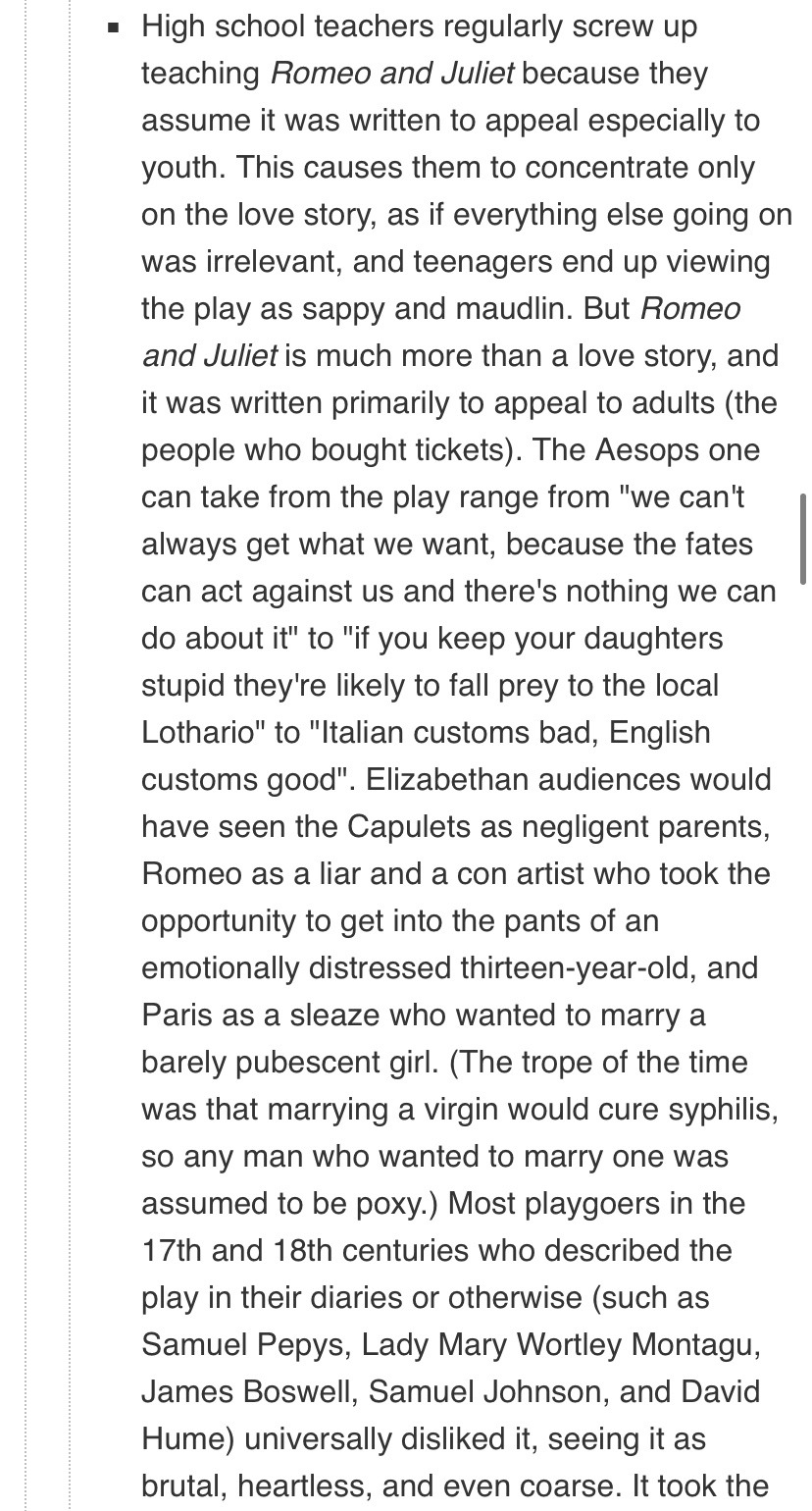
Already this one paragraph contains so much clownery. Such fresh and succulent meat cannot be good for you, alas. But I shall bear it for ye, my readers.
1. High school teachers teach love story so wrong!!! So I can’t speak for every high school English teacher out there, but as I was in training for the shit, let me tell you: The schools do 90% gun hard for the “cautionary tale/R&J’s tragic flaw was their impulsivity” element, with an added “Who is really responsible/the true villain for R&J’s deaths!!!” Very juvenile, but schools have to school, which means coming up with an Aesop, no matter how ill-fitting.
2. Elizabethan audiences would have seen—!!! Now this is just plain bullshitting. What evidence we have the Elizabethan reception of R&J has been consistently that of a very popular tragedy—the Second Quarto was titled “The Most Excellent and Lamentable Tragedy.” In an elegy to the late Richard Burbage, who played Romeo and countless other Shakespearean lead roles, the author wrote this:
Poor Romeo never more shall tears beget
For Juliet’s love and cruel Capulet.
This is a very positive portrayal of Romeo, Juliet, and the play itself, with an added slight at the feuding families. It also suggests that Capulet’s forcing Juliet to marry Paris left a very big impression on the Elizabethans. Romeo was definitely not seen as a Lothario but as a tragic hero.
3. Most 17th/18th century playgoers universally disliked it!!! Samuel Pepys is the only one that comes to mind, but even then he said only that the play was “the worst that ever I heard in my life, and the worst acted that ever I saw these people do.” Not that the play itself was coarse and brutal.
I’m not sure of the others, but considering they were writing in the neo-classism-loving milieu of the 17th century, Shakespeare’s dramatic realism would have been abhorrent to their sensibilities. That does not mean that the play itself is coarse. Just the 17th century being 17th century.
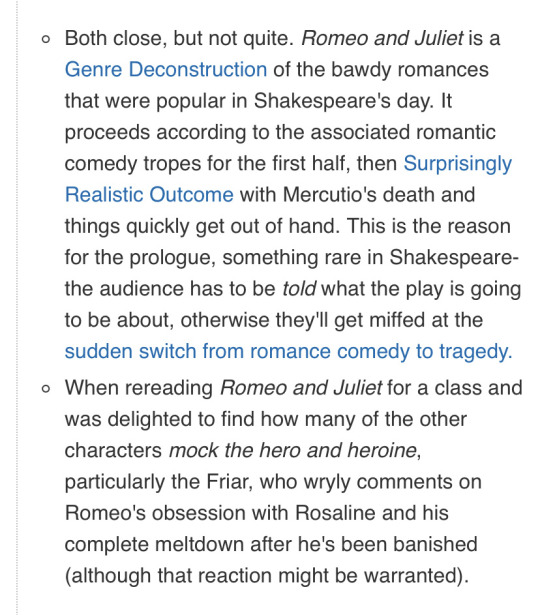
For the last time, there was no such thing as romance as a genre in Shakespeare’s day. The main genres were comedies, tragedies, pastoral, histories. Shakespeare’s later plays were experiments in tragicomedy. The romance plays are more kin to fantasy/sci-fi. Rom-com style plots (commedia dell’arte) were very much a thing, but they didn’t constitute their own genre—they were all under the comedy umbrella.
R&J establishes itself as a tragedy from the word go and literally every scene would have been full of red flags to the Elizabethans—Juliet at 13 urged to consider marriage, the Prince’s doom, Tybalt’s rage, and even the Nurse’s comedy about toddler!Juliet inadvertently making a double entendre. They would not have been at all surprised, because the tragic outcome was both explicitly stated in the Chorus and was well-foreshadowed by Shakespeare.
“Characters mock the main characters—” As said before, there are none. Mercutio mocks Romeo’s infatuation with Rosaline; he does not know about Juliet. The Friar is frustrated, bewildered, and even angry, but he does not mock Romeo; he takes him seriously. Benvolio is genuinely concerned.
Chopped Logic
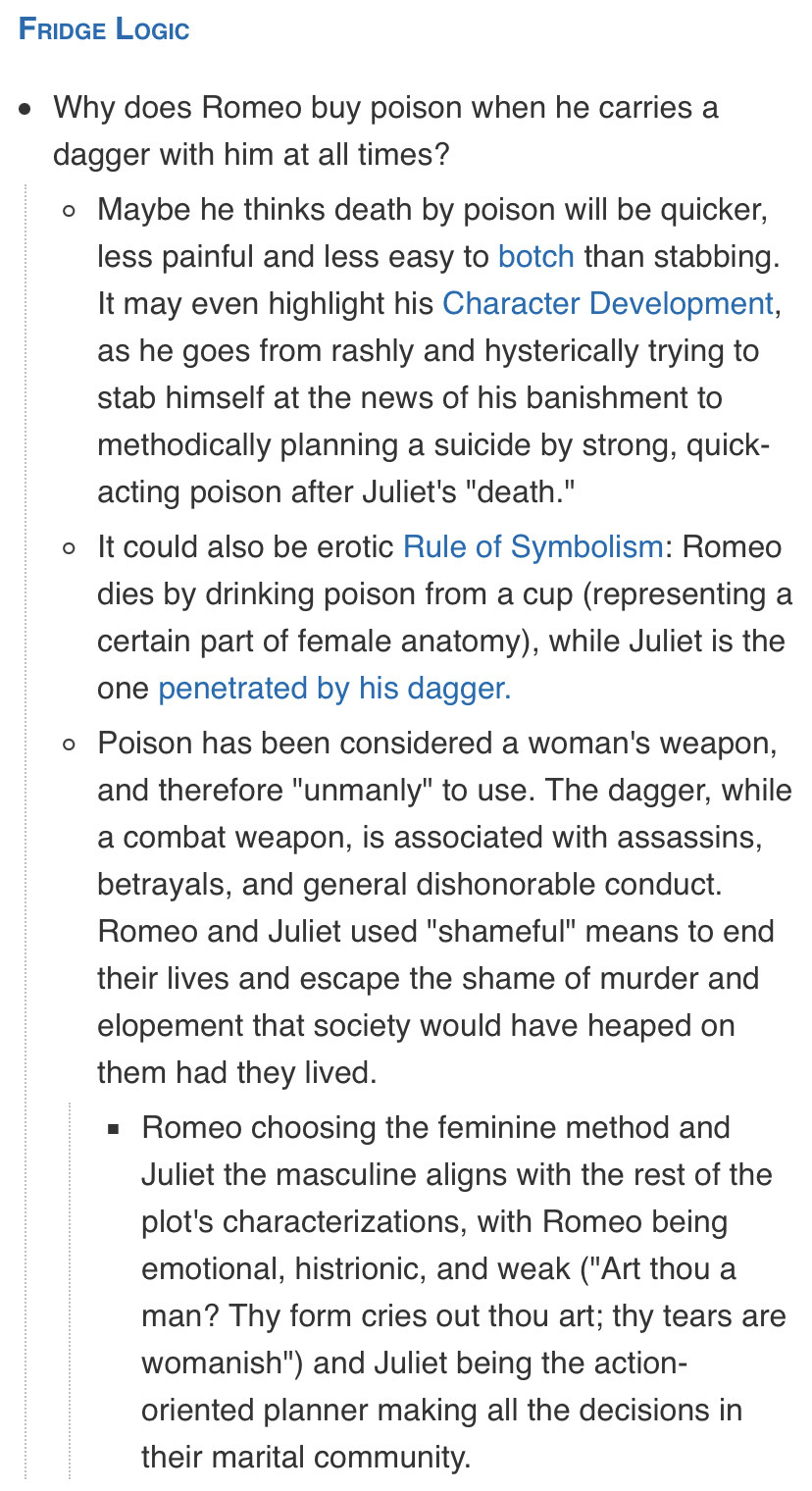
TV Tropes literally had the perfect answer in Rule of Symbolism, but alas, it just had to keep going.
No, Romeo’s choice of poison over a dagger doesn’t imply unmanliness in this context. Considering that he almost killed himself with his own dagger when he thought Juliet had rejected him and he killed Tybalt and Paris with swords, it can be argued that Romeo, ironically, is the most tied to the weapon save Tybalt. He is the one male character who wields it the most effectively, anyway, and the one character with the most kills in the play.
Occam’s Razor here, but for my part? It’s the erotic symbolism. Again, Shakespeare’s framing of the lovers’ suicide as romantic-erotic is part-and-parcel with the thematic concerns of the play overall.
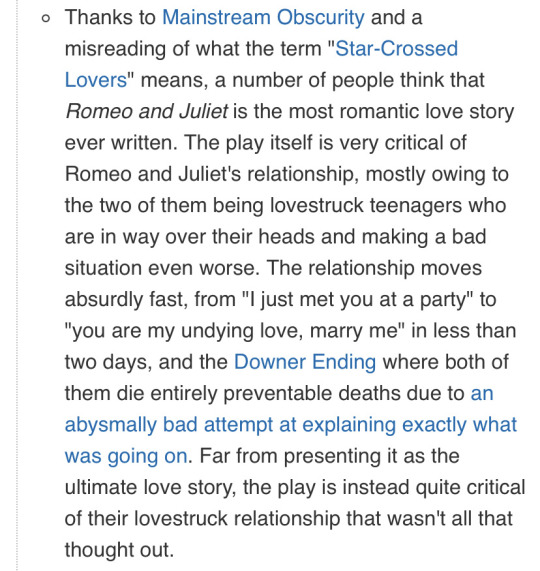
I have a whole-ass tag dedicated to analyzing the play and why the play as a whole is not critical of Romeo and Juliet’s relationship. On the contrary, it develops and exploits their love connection shamelessly, even giving them the best and most powerful lines and a full arc from obedient teens to courageous if vulnerable tragic heroes.
Their tragic end doesn’t even come at any of their actions, but the most dangerous and significant force of them all: The literal plague. It wasn’t a case of a faulty mailing system. Shakespeare literally used THE PLAGUE, which had ravished London for the better part of two years, as a plot point to doom the lovers. Shakespeare was not fucking around. He went so damn hard we’re still talking about it 400 years later.
As for the relationship moving absurdly fast, we literally have 2/3rds of all Shakespearean couples marrying at the end of their plays. Plays are not novels; all events must be condensed into the two and a half hours of their story. Hence the popularity of instalove as a trope and quick courtships.
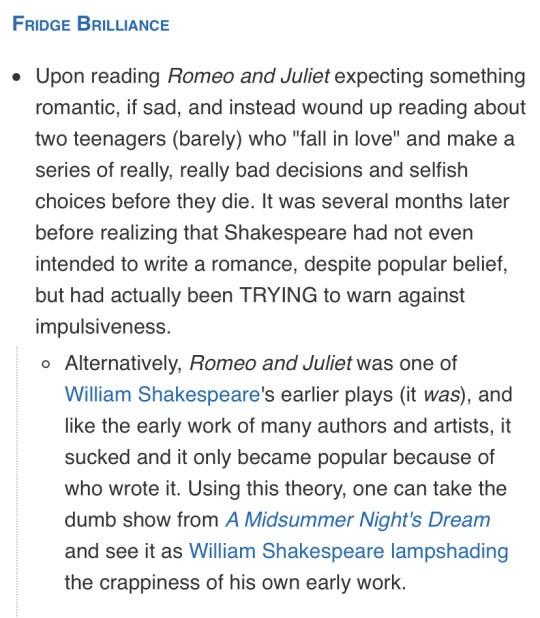
Ooh, about time these antis weaponized the Pyramus and Thisbe show in AMND against R&J. Unfortunately for them, I’ve been expecting this.
So the Pyramus and Thisbe show in Midsummer is brilliant in that the bulk of the comedy lies not in making fun of the story, but in making fun of amateur writing and acting—as in, the execution. It is riddled with all the hallmarks of bad writing and acting at all levels:
The players getting worried that the ladies would take the Lion as a real one and be frightened, so they write a fourth wall breaking speech for the actor
Creating whole-ass characters for The Wall and Moonshine to denote the literal wall and moon…when they could literally just say, “There’s a wall” or “It is night.”
The actors constantly forgetting their lines and not obeying punctuation and proper line reading
Just bad writing overall (“I see a voice!”)
Of course, Shakespeare was also flexing his skills at turning a tragedy into a comedy and (eventually) vice versa. But given that he would go on to write similar couples who fall in love immediately or very quickly (the love quartet in Love’s Labor’s Lost, Rosalind and Orlando, Fernando and Miranda, etc.) without satire, he most likely didn’t think the trope was inherently comic…or that his own carefully considered and very popular play of the same theme was crappy.
Also, consider Midsummer was written around the same time as R&J, to the point where academics like to call them sister plays.
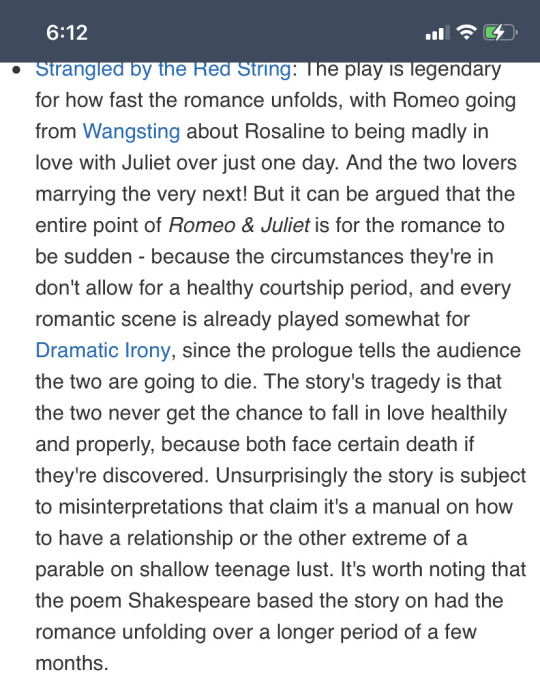
R&J just never got a chance to fall in love properly, guys. 😔 Their love was doomed only to remain stagnant at the shallow teen lust level 🥺 So tragic, so sad.
So falling in love /= courtship/dating. R&J never had a fulsome courtship for obvious reasons and are denied a chance to, but it’s undeniable that in the narrative they did fall in love. After the initial attraction of the Courtship Sonnet, they even managed to woo at the balcony scene. Their love is well established, so much so that more courtship would honestly been superfluous.
Shakespeare could have followed his source, Brooke’s poem, and the longer courtship there (three months, I think). But there Romeus and Juliet’s relationship is even less convincing than R&J’s. Dudes just fucked around for three months doing da sexy times!!! It reads, pretty much, that Romeus and Juliet only got married for the sex, which is not too far off given Brooke’s explicit agenda.
Meanwhile Shakespeare!R&J talk, woo, and decide to get married and…actually do it. And then consummate their marriage properly. Huh. Almost as if…they really are serious about each other and don’t just want fun sexy times.
Here Come Our Philosophers
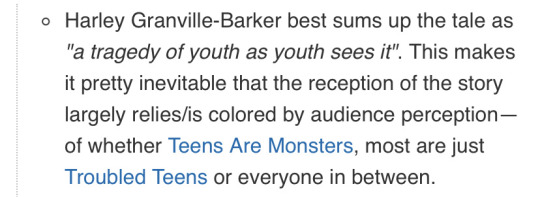
*studio audience groan* Not this shit again. This is one of those quotes that sounds profound but are really just absurd.
Suffice to say that R&J has a…very ambivalent reception among modern teens. In fact, I’d wager that most teenagers dislike/don’t care for R&J more than they do. I can assure you that it’s a particularly hard sell in YA unless changed to fit the tropes. Modern teens and even older ones, it turns out, don’t like unhappy endings to their ships.
Because while the play is sympathetic to the youths and their perspective…it’s a very adult kind of sympathy. And, in the end, understanding. Had it really taken a youthful perspective, R&J would just be another boring, trite power fantasy of super special teens who beat the odds—only instead of Chosen One shenanigans it’s you and your lover triumphing over your lameass parents and living happily ever after.
No teen (and adults too—it’s a human quality) truly believes their relationship will not last. Logically, they may acknowledge the possibility, but in the heat of it all, no. Shakespeare, though, does not indulge either teen or adult fantasies. He, frankly, didn’t give a fuck. He is a poet of nature—he writes how humans actually act, not how we think we should act.
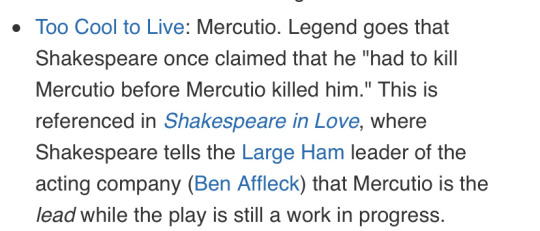
I have already addressed why I don’t think this particular legend is true, but I’ll deal with it here too.
Suffice to say, Mercutio was a character in Brooke’s poem, though a courtier and suitor to Juliet. Shakespeare changed him into Romeo’s friend and foil, which means that he almost certainly planned to kill him off.
Shakespeare’s Tybalt is a belligerent character, but one who takes honor and dueling seriously, so he would have never attacked Romeo when the latter refused him as Brooke’s Tybalt did in the poem. Thus, a sacrifice needed to be made, some very good reason as to why Romeo would consent to fight Tybalt. And since Benvolio is as close to a pacifist as this play gets, that role falls to Mercutio. This legend is definitely 17th century fanon.
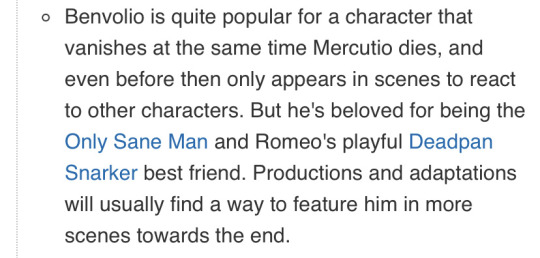
Only Sane Man I get, but…Deadpan Snarker? What? The only thing close to snark that Benvolio gets (in my memory, anyway) is “She will indite him to some supper,” mocking the Nurse’s malapropisms. Definitely not deadpan. Romeo trolls more (“One that God hath made, himself to mar”; A gentleman who speaks more in a minute than he would stand to in a month”) than Benvolio, especially with regards to Mercutio. Weird.
#romeo and juliet#rj clownery#r&j clown takes#rj clown takes#tv tropes#it’s still a swamp but a more organized one thankfully
7 notes
·
View notes